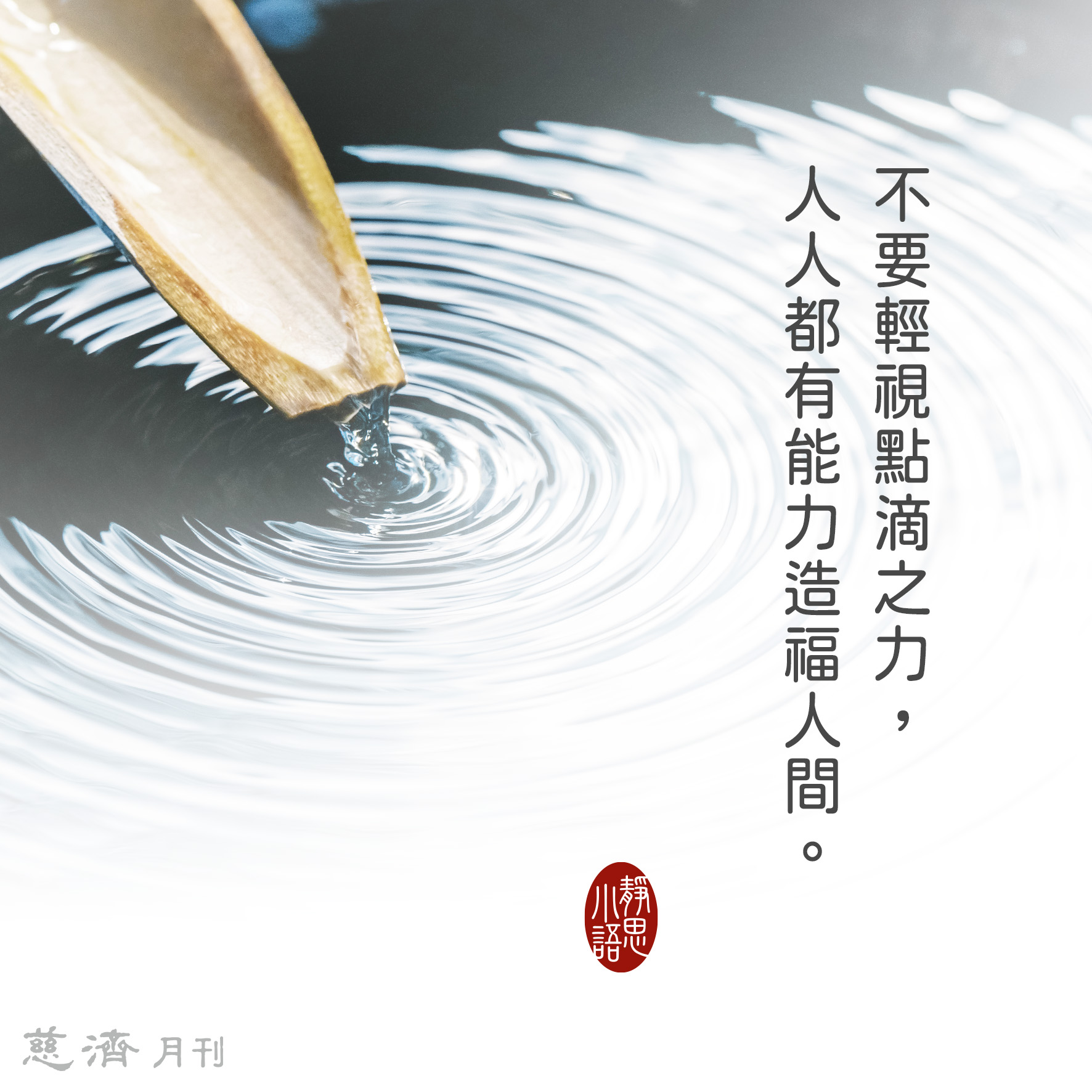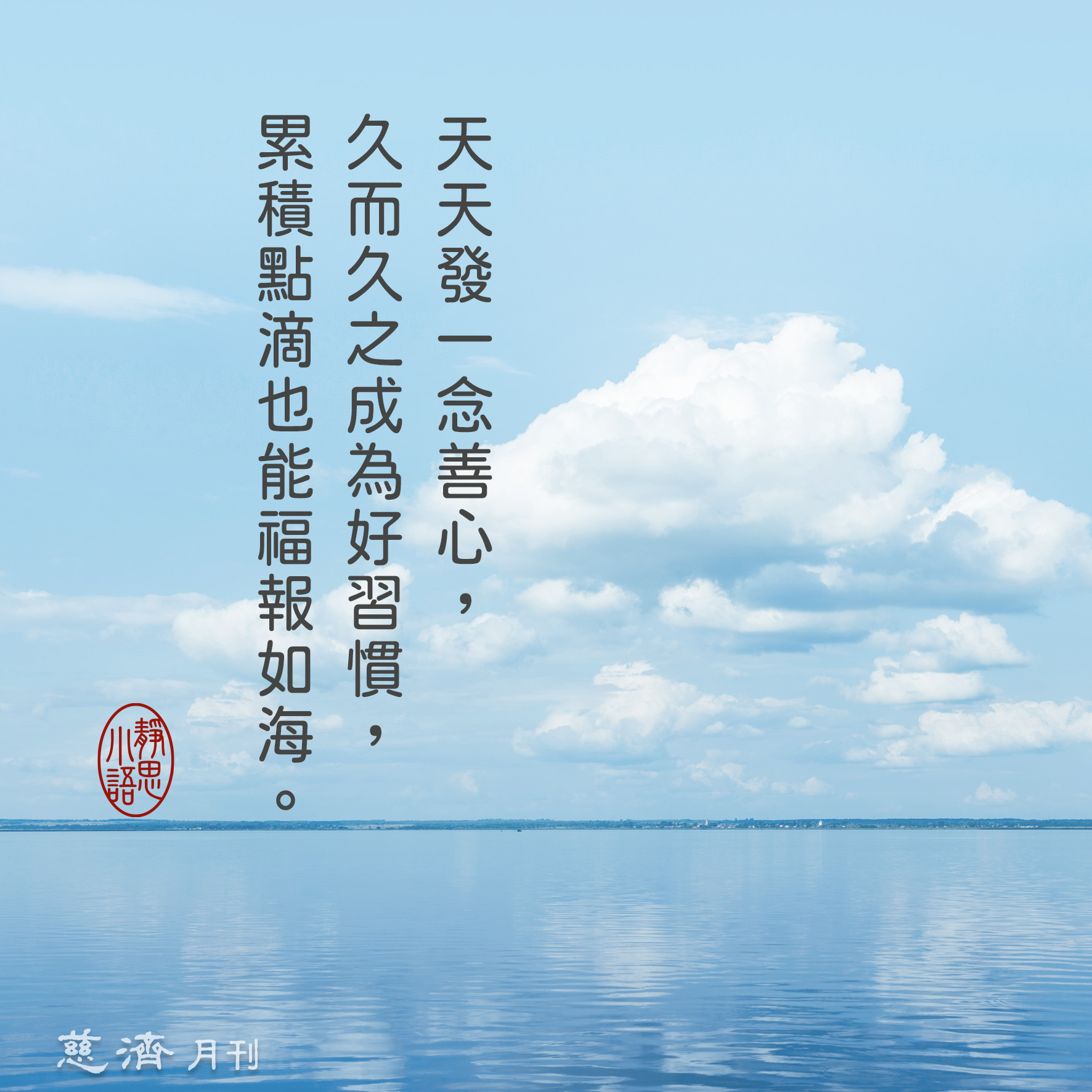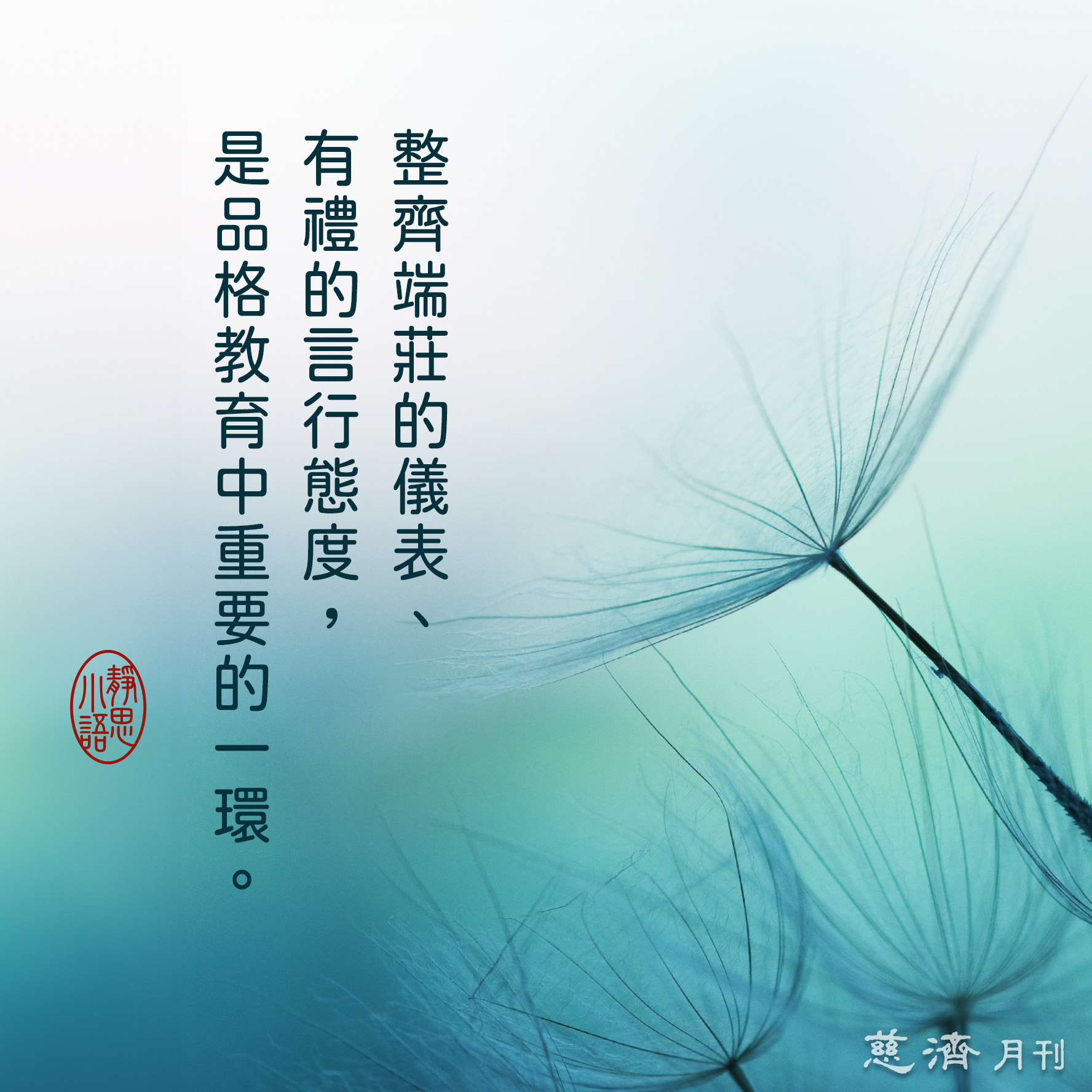從菜園到餐桌─新鮮、清淨又健康
前些天,寒流來襲,趁著還未下雨,一大早跟著德𦓹師父和幾位志工去田裏拔草。廣垠的天地下,位於靜思精舍協力工廠旁邊的一大片菜園很方正,一畦一畦的菜畦打得又直又漂亮,由師父帶著志工耕種。
每一畦種的都不一樣,冬季的萵苣、荷蘭豆、高麗菜、菠菜、茼蒿、A菜、白蘿蔔、芥藍等,夏季的番薯葉、刀豆仍延續生長,讓菜餚畫龍點睛的九層塔、香菜,也在此占有一席之地。
盈盈綠意中,有一畦很特別,種的是百香果。碧綠的果實垂在瓜架下,有幾粒已轉紅,「再過兩三天就可以摘收了,天然、清甜、新鮮,好吃得不得了……」眾人隨著志工班長手指的方向看過去,望著變紅的果子,好期待喔。
「我們不用農藥、不施化肥,種的東西沒有不健康的,吃得就比較安心。因為健康,常住當然也會煮給上人吃。」秉持「清淨在源頭」理念,對種植健康農作物很有信心的師父一旁補充。

無比感恩地對待食物
菜園裏四季更迭,各種蔬果也輪番上陣。精舍師父們日復一日地謹守「一日不做,一日不食」的靜思家風,自力耕生維持生活,也熱情招待自四方八面歸來的慈濟人與參訪的善心大德。
正埋頭拔草,師父的手機突然響起,驚飛一旁覓食的小鳥。
「師父好,請問您田裏有香菜嗎?」精舍大寮(廚房)負責備餐的師父來電。
「有。」
「今天中午煮關東煮,需要香菜配色,拜託幫忙採一些送來,可以嗎?」
「好的,沒問題。」
天氣變冷,師父們貼心地要煮熱湯,暖大家的胃。
精舍的菜單通常是「四菜一湯」,鹹淡得宜的菜色搭配,好看又好吃。一種是青菜類,多為精舍菜園採摘的鮮蔬;二是豆腐、豆包、麵腸等豆料,是蛋白質的來源;三是滷物,比如滷冬瓜、菜心、苦瓜、海帶等;四是配色菜,比如西洋芹搭配紅蘿蔔、白果等,以五種顏色包羅食物的多元營養。
上午十一點過後,大寮各項菜餚煮好、起鍋,迅速裝盤,師父們與志工協力出菜,整整齊齊擺上餐桌。齋堂裏五、六十張圓桌排開,每一桌公筷母匙,米飯盛在不鏽鋼小鍋裏,一只光潔小茶壺裝著熱開水。
各人吃多少裝多少,飯菜用完,從小茶壺中倒出熱開水,在碗中晃晃,將殘餘油水一飲而盡,以這個動作結束用餐。食物在這裏,被無比感恩地對待與珍惜。
全球有超過八億人口長期挨餓,占世界總人口約百分之十。根據環保署推估,臺灣每年浪費約一百三十五萬噸食物;若以每人每年五百四十七公斤糧食計算,可讓兩百四十多萬人溫飽,也令人想起這句俗諺:「富家一餐飯,窮人半年糧。」

改變世界的一餐
人與大自然韻律和諧是理想,也是目標,飲食不再只是填飽肚子的日常小事,人類葷食對生態的影響力已嚴重威脅地球。二○二三年十一月十七日,全球升溫首破攝氏二度。聯合國最新報告也指出,如果不採取更強有力的行動,氣候將升溫攝氏三度,恐對地球造成災難性、不可逆轉的衝擊。
「五穀雜糧能夠維護身體的健康,就是最好的食物。」上人殷切期盼:「為保護地球,人人非茹素不可。」
國際保育人士珍‧古德二○○七年受邀來臺時,就提出「每一餐所吃,都可能改變世界」的呼籲,試圖用改變飲食來保護地球。
對於飲食來源的源頭—農田,上人一再呼籲回歸自然。依循四時節氣,在地耕種,當令採收。有鳥兒飛,有蟲兒跑,表示這塊土地仍活躍著生生不息的古老農耕智慧。
吃在地,吃當季,減少食物的運送里程,降低包裝製造所產生的二氧化碳及污染,不因畜養牲畜而耗費大量的水、砍伐森林。關懷世間的飢餓者及日益惡化的環境,這基本的人道精神,就從每一餐的簡樸素食、感恩食物做起。


前些天,寒流來襲,趁著還未下雨,一大早跟著德𦓹師父和幾位志工去田裏拔草。廣垠的天地下,位於靜思精舍協力工廠旁邊的一大片菜園很方正,一畦一畦的菜畦打得又直又漂亮,由師父帶著志工耕種。
每一畦種的都不一樣,冬季的萵苣、荷蘭豆、高麗菜、菠菜、茼蒿、A菜、白蘿蔔、芥藍等,夏季的番薯葉、刀豆仍延續生長,讓菜餚畫龍點睛的九層塔、香菜,也在此占有一席之地。
盈盈綠意中,有一畦很特別,種的是百香果。碧綠的果實垂在瓜架下,有幾粒已轉紅,「再過兩三天就可以摘收了,天然、清甜、新鮮,好吃得不得了……」眾人隨著志工班長手指的方向看過去,望著變紅的果子,好期待喔。
「我們不用農藥、不施化肥,種的東西沒有不健康的,吃得就比較安心。因為健康,常住當然也會煮給上人吃。」秉持「清淨在源頭」理念,對種植健康農作物很有信心的師父一旁補充。

無比感恩地對待食物
菜園裏四季更迭,各種蔬果也輪番上陣。精舍師父們日復一日地謹守「一日不做,一日不食」的靜思家風,自力耕生維持生活,也熱情招待自四方八面歸來的慈濟人與參訪的善心大德。
正埋頭拔草,師父的手機突然響起,驚飛一旁覓食的小鳥。
「師父好,請問您田裏有香菜嗎?」精舍大寮(廚房)負責備餐的師父來電。
「有。」
「今天中午煮關東煮,需要香菜配色,拜託幫忙採一些送來,可以嗎?」
「好的,沒問題。」
天氣變冷,師父們貼心地要煮熱湯,暖大家的胃。
精舍的菜單通常是「四菜一湯」,鹹淡得宜的菜色搭配,好看又好吃。一種是青菜類,多為精舍菜園採摘的鮮蔬;二是豆腐、豆包、麵腸等豆料,是蛋白質的來源;三是滷物,比如滷冬瓜、菜心、苦瓜、海帶等;四是配色菜,比如西洋芹搭配紅蘿蔔、白果等,以五種顏色包羅食物的多元營養。
上午十一點過後,大寮各項菜餚煮好、起鍋,迅速裝盤,師父們與志工協力出菜,整整齊齊擺上餐桌。齋堂裏五、六十張圓桌排開,每一桌公筷母匙,米飯盛在不鏽鋼小鍋裏,一只光潔小茶壺裝著熱開水。
各人吃多少裝多少,飯菜用完,從小茶壺中倒出熱開水,在碗中晃晃,將殘餘油水一飲而盡,以這個動作結束用餐。食物在這裏,被無比感恩地對待與珍惜。
全球有超過八億人口長期挨餓,占世界總人口約百分之十。根據環保署推估,臺灣每年浪費約一百三十五萬噸食物;若以每人每年五百四十七公斤糧食計算,可讓兩百四十多萬人溫飽,也令人想起這句俗諺:「富家一餐飯,窮人半年糧。」

改變世界的一餐
人與大自然韻律和諧是理想,也是目標,飲食不再只是填飽肚子的日常小事,人類葷食對生態的影響力已嚴重威脅地球。二○二三年十一月十七日,全球升溫首破攝氏二度。聯合國最新報告也指出,如果不採取更強有力的行動,氣候將升溫攝氏三度,恐對地球造成災難性、不可逆轉的衝擊。
「五穀雜糧能夠維護身體的健康,就是最好的食物。」上人殷切期盼:「為保護地球,人人非茹素不可。」
國際保育人士珍‧古德二○○七年受邀來臺時,就提出「每一餐所吃,都可能改變世界」的呼籲,試圖用改變飲食來保護地球。
對於飲食來源的源頭—農田,上人一再呼籲回歸自然。依循四時節氣,在地耕種,當令採收。有鳥兒飛,有蟲兒跑,表示這塊土地仍活躍著生生不息的古老農耕智慧。
吃在地,吃當季,減少食物的運送里程,降低包裝製造所產生的二氧化碳及污染,不因畜養牲畜而耗費大量的水、砍伐森林。關懷世間的飢餓者及日益惡化的環境,這基本的人道精神,就從每一餐的簡樸素食、感恩食物做起。


長住藍毘尼 寫在新年之初
一年八個月在藍毘尼,
逐步適應熱浪來襲的灼熱感和寒流入骨的冰冷,
克服困難的勇氣和堅定,
來自於每次聽到響應「弘法利生」匯聚愛心的故事,
以及全球慈濟人回報佛陀故鄉的心願。
一年八個月在藍毘尼,逐步適應熱浪來襲的灼熱感和寒流入骨的冰冷,克服困難的勇氣和堅定,來自於每次聽到響應「弘法利生」匯聚愛心的故事,以及全球慈濟人回報佛陀故鄉的心願。
尼泊爾藍毘尼的冬天,寒冷之極,看不到我在熱帶熟悉的太陽;但是心不冷,懷抱著的夢想,就是靠我們彼此發願而萌生的勇氣,相信逆境總會帶來光芒。
為了元月六日藍毘尼歲末祝福與冬令發放中的手語演繹,志工多次邀請村民參加入經藏。編織絨線帽的婦女,聽了我們解說後,手中忙著編織,議論紛紛:「我不敢報名,先生會罵我。」「對不起,我爸爸沒有同意,我不敢報名。」……
在當地傳統觀念下,婦女出門不易,村民反應冷淡;十二月底,團隊決定下鄉,與當地婦女更親近接觸。小車擠進五位手語教學志工,加上協助翻譯的本土志工和真善美志工,緊緊靠著的體溫溫暖了彼此;雖然示範解說與互動後,只邀請到十五位婦女報名參加,大家依然認真講解。本土志工安慰我們:「許多人這時間都在忙家務,她們會參加的。」
午後,我們焦急地站在大馬路邊等待,到村裏接婦女們來練習手語的大巴士緩慢經過會所,車尾冒出灰呼呼的煙,車子停下來時,我們看到黑壓壓地擠滿了人!
到了練習的地點,穿著豔麗的婦女依序下車,本土志工數著人數:「您看她們真的來參加了,來了八十三人!」
接下來的幾天,有人來了,覺得做不到退出了;有人沒有報名,聽到鄰居分享,臨時加入;人數每天起落,但我們想著只要願意從村裏面出來,哪怕到了最後一天,只剩一人,我們都不想放棄。所幸隨著時間的推進,人員愈來愈穩定,大家開始進入狀況。

婦女們來到藍毘尼佛教大學手語集訓,跟著志工熟悉音樂節拍,把每個動作慢慢學起來。(攝影/林俊業)
從如何走路開始
歲末祝福中演繹的〈行願半世紀〉,由慈濟志工領隊,隨後是見習培訓的當地志工,再接著村莊的婦女,象徵佛弟子回歸佛陀故鄉,一生無量;這樣一個簡單的構思,從開始引導婦女們排隊,左腳、右腳調整走路的步調,還要請大家調整呼吸、輕聲說話,一一解說示範。
歲末祝福正式上場時,在藍毘尼佛教大學禮堂,每一位婦女從當初的喧嘩急躁,到這日穿著紅色沙麗,頭髮整齊,步履堅定,神情恬靜;看到一人跟著一人走到臺上時,我在音控位置旁已經淚流滿面。
從二○二二年四月二十八日參與第一梯次志工,從馬來西亞前往尼泊爾,近兩年來已往返藍毘尼十四次了;如果真的要問:「一年八個月,難嗎?」我如實回答:「難!前所未有的難。」
這一個「難」,確實不知如何用言語述說,唯有在那遼闊的平原上,在當地人樂觀的性格裏,我由衷感受到精神被滋養豐潤,克服了生命未曾有過的艱難。
一年八個月在藍毘尼,星馬的法親們輪番接力,這裏已經是我們非常熟悉的地方,習慣了空氣中濃郁的瑪撒拉(masala)香料味道,逐步適應了當地熱浪來襲的灼熱和寒流入骨的冰冷。克服困難的勇氣和堅定,來自於每一次聽到響應「弘法利生」匯聚愛心的故事,以及全球慈濟人同心,要回報佛陀故鄉的心願。在藍毘尼、菩提迦耶接力駐守的每位志工,背後總有一股強大的力量在支持著每一步路。
眼淚落下的時候,是生命與生命碰撞之後相互了解的觸動,也是因為背後龐大的力量,是人人心中的大愛,讓許多不可能的事情,神奇地發生在佛陀的故鄉!

一年八個月在藍毘尼,
逐步適應熱浪來襲的灼熱感和寒流入骨的冰冷,
克服困難的勇氣和堅定,
來自於每次聽到響應「弘法利生」匯聚愛心的故事,
以及全球慈濟人回報佛陀故鄉的心願。
一年八個月在藍毘尼,逐步適應熱浪來襲的灼熱感和寒流入骨的冰冷,克服困難的勇氣和堅定,來自於每次聽到響應「弘法利生」匯聚愛心的故事,以及全球慈濟人回報佛陀故鄉的心願。
尼泊爾藍毘尼的冬天,寒冷之極,看不到我在熱帶熟悉的太陽;但是心不冷,懷抱著的夢想,就是靠我們彼此發願而萌生的勇氣,相信逆境總會帶來光芒。
為了元月六日藍毘尼歲末祝福與冬令發放中的手語演繹,志工多次邀請村民參加入經藏。編織絨線帽的婦女,聽了我們解說後,手中忙著編織,議論紛紛:「我不敢報名,先生會罵我。」「對不起,我爸爸沒有同意,我不敢報名。」……
在當地傳統觀念下,婦女出門不易,村民反應冷淡;十二月底,團隊決定下鄉,與當地婦女更親近接觸。小車擠進五位手語教學志工,加上協助翻譯的本土志工和真善美志工,緊緊靠著的體溫溫暖了彼此;雖然示範解說與互動後,只邀請到十五位婦女報名參加,大家依然認真講解。本土志工安慰我們:「許多人這時間都在忙家務,她們會參加的。」
午後,我們焦急地站在大馬路邊等待,到村裏接婦女們來練習手語的大巴士緩慢經過會所,車尾冒出灰呼呼的煙,車子停下來時,我們看到黑壓壓地擠滿了人!
到了練習的地點,穿著豔麗的婦女依序下車,本土志工數著人數:「您看她們真的來參加了,來了八十三人!」
接下來的幾天,有人來了,覺得做不到退出了;有人沒有報名,聽到鄰居分享,臨時加入;人數每天起落,但我們想著只要願意從村裏面出來,哪怕到了最後一天,只剩一人,我們都不想放棄。所幸隨著時間的推進,人員愈來愈穩定,大家開始進入狀況。

婦女們來到藍毘尼佛教大學手語集訓,跟著志工熟悉音樂節拍,把每個動作慢慢學起來。(攝影/林俊業)
從如何走路開始
歲末祝福中演繹的〈行願半世紀〉,由慈濟志工領隊,隨後是見習培訓的當地志工,再接著村莊的婦女,象徵佛弟子回歸佛陀故鄉,一生無量;這樣一個簡單的構思,從開始引導婦女們排隊,左腳、右腳調整走路的步調,還要請大家調整呼吸、輕聲說話,一一解說示範。
歲末祝福正式上場時,在藍毘尼佛教大學禮堂,每一位婦女從當初的喧嘩急躁,到這日穿著紅色沙麗,頭髮整齊,步履堅定,神情恬靜;看到一人跟著一人走到臺上時,我在音控位置旁已經淚流滿面。
從二○二二年四月二十八日參與第一梯次志工,從馬來西亞前往尼泊爾,近兩年來已往返藍毘尼十四次了;如果真的要問:「一年八個月,難嗎?」我如實回答:「難!前所未有的難。」
這一個「難」,確實不知如何用言語述說,唯有在那遼闊的平原上,在當地人樂觀的性格裏,我由衷感受到精神被滋養豐潤,克服了生命未曾有過的艱難。
一年八個月在藍毘尼,星馬的法親們輪番接力,這裏已經是我們非常熟悉的地方,習慣了空氣中濃郁的瑪撒拉(masala)香料味道,逐步適應了當地熱浪來襲的灼熱和寒流入骨的冰冷。克服困難的勇氣和堅定,來自於每一次聽到響應「弘法利生」匯聚愛心的故事,以及全球慈濟人同心,要回報佛陀故鄉的心願。在藍毘尼、菩提迦耶接力駐守的每位志工,背後總有一股強大的力量在支持著每一步路。
眼淚落下的時候,是生命與生命碰撞之後相互了解的觸動,也是因為背後龐大的力量,是人人心中的大愛,讓許多不可能的事情,神奇地發生在佛陀的故鄉!

687期—慈濟誌 天下事
2023
12/18
海地暴力攻擊 受難志工獲援
二○二三年八月中旬以來,海地首都太子港的暴力攻擊愈演愈烈,數十個武裝團體為爭奪領土混戰不休,焚燒建物、摧毀商業,導致四萬人流離失所,加劇了本已錯綜複雜的人道危機,全國近半數人民面臨嚴重的糧食不安全問題。
慈濟於二○二三年共進行三批大米發放,與教會合作提供給學校、老人院、孤兒院。慈濟園區附近也出現幫派打劫、勒索風險,歲末時志工設法前來舉辦祈福活動,並且提供受難的十八位法親生活補助金,讓他們度過艱難處境
2023
12/19、21
泰國發放購物券 國際難民安心過年
慈濟泰國分會長期照顧境內國際難民,提供米、油等物資,此次首度發放購物券,嘉惠一千七百五十三戶,每戶五千泰銖(約新臺幣四千五百元),讓他們能到特定超市選購實際需要的物品,減輕生活負擔,在漫長逃難險途與衣食匱乏的歲月中,安心迎接新年到來
2023
12/26~31
全球慈青營隊 疫後首度舉辦
受全球新冠疫情影響而停辦四年的「海外慈青幹部研習營暨全球慈青年會」,首度移師彰化靜思堂,十三個國家地區近五百名慈青學子齊聚,展開七天課程;十二月三十一日於臺中靜思堂歲末祝福中,二十多位慈青受證為慈濟志工
2024
1/1
日本能登半島強震 零度下馳援熱食
石川縣能登半島元月一日發生芮氏規模七點六強震,官方命名為「令和六年能登半島地震」,造成三萬戶房屋受損,逾兩百人罹難。慈濟志工元月五日進入石川縣穴水町、七尾市勘災,十三日起於穴水町製作熱食發放,照顧民眾與救災人員。
東京和大阪距離穴水町均在三百公里以上,志工分四梯前來接力,每日供餐平均約四百餘份;元月底結束供食,並參考政府救災計畫評議後續援助;東京、大阪、東北石卷慈濟志工於二十一日起展開街頭募款,為重建挹注力量
2024
1/5~8
歐蒂斯颶風重創墨西哥 跨宗教合作發放
墨西哥濱海城鎮阿卡普爾科市(Acapulco)二○二三年十月二十五日遭受五級颶風歐蒂斯侵襲,數千棟房屋被摧毀,超過二十五萬人生活受到嚴重影響;美國志工十一月中於格雷羅州(Guerrero)多個重災區勘災,並獲得當地教會及慈善組織協助賑災;二○二四年一月五日至八日,美國、厄瓜多、西班牙、阿根廷及墨西哥本土志工共一百三十三位,於當地法蒂瑪聖母堂發放物資卡共三千八百一十四戶,確保二個月生活無虞
2024
1/6
全臺第六家大愛幼兒園於臺中招生
全臺第六家慈濟大愛幼兒園於臺中啟用,繼花蓮、臺北、高雄、臺南和嘉義大林之後,以健康力、生活力和學習力為幼兒打底;園址位於臺中慈濟醫院後方,緊鄰醫護宿舍大樓,視野遼闊,空氣清新,將於二月十九日迎接首屆孩童入學
2024
1/20
全臺五十五場冬令發放暨圍爐 弱勢家庭過心年
元月二十日起,五十五場冬令發放暨圍爐陸續在全臺各會所舉辦,北區部分場次與社區歲末祝福結合,邀請照顧戶參與;部分縣市由志工逐戶親送祝福。慈濟基金會延續與全聯超市合作,依家庭人口數致贈物資卡,可直接到店採購年貨或生活用品,偏遠地區或行動不便無法外出者改以現金替代;將有逾二萬七百戶受惠

2023
12/18
海地暴力攻擊 受難志工獲援
二○二三年八月中旬以來,海地首都太子港的暴力攻擊愈演愈烈,數十個武裝團體為爭奪領土混戰不休,焚燒建物、摧毀商業,導致四萬人流離失所,加劇了本已錯綜複雜的人道危機,全國近半數人民面臨嚴重的糧食不安全問題。
慈濟於二○二三年共進行三批大米發放,與教會合作提供給學校、老人院、孤兒院。慈濟園區附近也出現幫派打劫、勒索風險,歲末時志工設法前來舉辦祈福活動,並且提供受難的十八位法親生活補助金,讓他們度過艱難處境
2023
12/19、21
泰國發放購物券 國際難民安心過年
慈濟泰國分會長期照顧境內國際難民,提供米、油等物資,此次首度發放購物券,嘉惠一千七百五十三戶,每戶五千泰銖(約新臺幣四千五百元),讓他們能到特定超市選購實際需要的物品,減輕生活負擔,在漫長逃難險途與衣食匱乏的歲月中,安心迎接新年到來
2023
12/26~31
全球慈青營隊 疫後首度舉辦
受全球新冠疫情影響而停辦四年的「海外慈青幹部研習營暨全球慈青年會」,首度移師彰化靜思堂,十三個國家地區近五百名慈青學子齊聚,展開七天課程;十二月三十一日於臺中靜思堂歲末祝福中,二十多位慈青受證為慈濟志工
2024
1/1
日本能登半島強震 零度下馳援熱食
石川縣能登半島元月一日發生芮氏規模七點六強震,官方命名為「令和六年能登半島地震」,造成三萬戶房屋受損,逾兩百人罹難。慈濟志工元月五日進入石川縣穴水町、七尾市勘災,十三日起於穴水町製作熱食發放,照顧民眾與救災人員。
東京和大阪距離穴水町均在三百公里以上,志工分四梯前來接力,每日供餐平均約四百餘份;元月底結束供食,並參考政府救災計畫評議後續援助;東京、大阪、東北石卷慈濟志工於二十一日起展開街頭募款,為重建挹注力量
2024
1/5~8
歐蒂斯颶風重創墨西哥 跨宗教合作發放
墨西哥濱海城鎮阿卡普爾科市(Acapulco)二○二三年十月二十五日遭受五級颶風歐蒂斯侵襲,數千棟房屋被摧毀,超過二十五萬人生活受到嚴重影響;美國志工十一月中於格雷羅州(Guerrero)多個重災區勘災,並獲得當地教會及慈善組織協助賑災;二○二四年一月五日至八日,美國、厄瓜多、西班牙、阿根廷及墨西哥本土志工共一百三十三位,於當地法蒂瑪聖母堂發放物資卡共三千八百一十四戶,確保二個月生活無虞
2024
1/6
全臺第六家大愛幼兒園於臺中招生
全臺第六家慈濟大愛幼兒園於臺中啟用,繼花蓮、臺北、高雄、臺南和嘉義大林之後,以健康力、生活力和學習力為幼兒打底;園址位於臺中慈濟醫院後方,緊鄰醫護宿舍大樓,視野遼闊,空氣清新,將於二月十九日迎接首屆孩童入學
2024
1/20
全臺五十五場冬令發放暨圍爐 弱勢家庭過心年
元月二十日起,五十五場冬令發放暨圍爐陸續在全臺各會所舉辦,北區部分場次與社區歲末祝福結合,邀請照顧戶參與;部分縣市由志工逐戶親送祝福。慈濟基金會延續與全聯超市合作,依家庭人口數致贈物資卡,可直接到店採購年貨或生活用品,偏遠地區或行動不便無法外出者改以現金替代;將有逾二萬七百戶受惠

一至二日 我要做好事
12.1~2《農十月‧十九至二十》

【靜思小語】不要輕視點滴之力,人人都有能力造福人間。
《證嚴上人衲履足跡》有聲書,由慈濟人文志業廣播內容創作中心提供,更多精彩的廣播節目,歡迎到「大愛網路電台」收聽。
付出無所求的志工精神
慈濟志業從慈善起步,如今慈善志業國際化,接受過慈濟人道關懷的國家地區已有一百三十三個。十二月一日,上人於慈善董事會開示:「感恩所有的慈濟人,也感恩顏執行長領導團隊,很認真、很用心,把慈濟推上國際平臺,展現慈濟志工付出無所求的精神。也要請人文志業將慈濟歷史不斷地彙整並展示,慈濟在臺灣也真正做出典範。」
上人說,全球慈濟人都是志工,慈濟志業仰賴這麼多付出無所求的志工成就,尤其慈善志業從臺灣到海外救苦救難,都是各地慈濟志工親手布施、擁抱膚慰,或是跨國合力去援助。事是人做出來的,人多力量大,所以期盼每一個國家地區都有慈濟人;而同仁們尊重志工,效法志工精神,盡心力處理行政工作,才能讓海內外的慈濟事順利推行。
上人表示自己對全球慈濟人有無盡的感恩,也很感恩臺灣平安有福,能將慈濟大愛從臺灣發揚到國際間;而今國際間不斷發生天災、人禍,期待慈善志業要再提升,要有開闊的國際視野,儘速推行已有明確方向的國際慈善事務,不負捐款人的信任與期許。
天下有許多國家的苦難人都需要幫助,不過現在看來,佛陀故鄉的尼泊爾與印度,目前有好因緣,可以即時著手進行慈善、醫療、教育等方面的援助行動。上人表示,從人道觀點來看,當地村落居民生活貧困匱乏的程度,讓人看了很不忍心;從佛弟子的角度,那是佛陀的故鄉,感情上也想要回報佛恩。而馬來西亞、新加坡慈濟人發心輪梯前往駐紮在尼泊爾藍毘尼與印度菩提迦耶,在慈善訪視、職訓帶動方面已經初有成效,並且與當地學校密切互動,帶動出一群投入教聯會的校長與老師。既然有此好因緣,在住屋、學校的援建,可以快速進行。
竹筒歲月啟發人人善念
十二月二日,印尼慈濟人與上人座談,黃榮年師兄分享金光集團目前有三十八個協力組,並發願要做到公司三公里內的範圍,沒有兔唇、疝氣以及營養不良的個案,同時向員工推動素食。上人讚佩榮年師兄及李麗英師姊等人,在各自的公司,用「竹筒歲月」的方法鼓勵員工行善,在不影響生活的前提下,把握機會做好事,是很有智慧的做法。
「不要輕視點滴之力,而且招募慈濟會員,主要是啟發人人的愛心,讓更多人知道自己也有能力造福人間;投下一個銅板,知道『我在做好事』,會自我肯定,多了一分為人間付出的善念,自然就減少做壞事的惡念,無形中為社會消災、增福。」上人表示,「竹筒歲月」的觀念與做法若可以推廣,帶動人人響應;「我要做好事」的念頭一起,並投下零錢,將善念付諸行動,這是對社會大眾最好的教育。除了帶動行善,還要推動素食;企業家以自身的社會影響力推素,會更有成效。
談及因緣果報觀,上人表示,正信宗教都鼓勵人們行善、不要做危害人間的事,也有做好事升天堂、做壞事下地獄之說;佛法以因緣果報說明,無論善報、惡報,都是自己做、自己得,而且不只要人行善升天堂,還要超越天堂,行菩薩道,利他為先。只要對人群有益的事,做到以後,人群得到了利益,愛的種子也播入人群;看到曾經接受幫助的苦難人已經能夠自立,且亦用愛回饋社會人間,當時付出幫助他們的人也會很開心。
「就如師父聽到你們在印尼怎麼做慈濟,我感到很歡喜,我得到的最多,因為我有一群好弟子,身體力行人間菩薩道,做得很成功,所以會很滿足、很感恩。」回過頭來談素食,上人說,若人們為了口欲而殺生,就與眾生結了惡緣;做生意賺錢,也要避免殺生。多推素食降低世間的殺業,也可以降低人間的暴戾之氣,「人氣」祥和,天氣與地氣也會慢慢回歸調和。
「我們盡心力呼籲、帶動,別人願不願意響應,還是要看每個人的意願;造福是靠自己發心,就如修行也是自修自得。」上人期勉印尼慈濟人,具有精神理念,也需要用形象表達出來,讓印尼民眾看見佛教的莊嚴形象,了解佛教不是拜拜求平安的宗教,而是能夠運用在生活中的教育。
這幾十年來,慈濟人與慈濟會員遍布世界各地,非佛教徒的慈濟人也愈來愈多,大家有共同的精神理念,這也是慈濟宗門的特色,而慈濟宗門的精神理念就來自靜思法脈。「慈濟立宗門,還要有法的系統,源頭就是『為佛教,為眾生』。四大志業就是為眾生而設立,為佛教,大家要記得,若沒有佛教,今天就沒有我;沒有我,今天就沒有慈濟。」
上人期許印尼大愛臺以傳播媒體的力量宣導善法,發揮淨化人心的良能。「無論信仰什麼宗教,能夠讓人的心安定、有依靠,就是好的宗教,好的宗教教法都值得弘揚;還有印尼慈濟志業的歷史,也就是你們這群慈濟人的生命歷史,你們與師父師徒之緣,如何在印尼落實志業、弘傳法脈,這樣的經過也是很寶貴的法,是你們將慈濟的法從臺灣帶回印尼,取經弘法,把握因緣讓佛教入世,利益人間。」
本專欄為靜思人文出版之《證嚴上人衲履足跡》精簡版;更完整的慈濟脈動與開示內容,以及師徒之間的感人對談,請展閱每季出版的《證嚴上人衲履足跡》

12.1~2《農十月‧十九至二十》

【靜思小語】不要輕視點滴之力,人人都有能力造福人間。
《證嚴上人衲履足跡》有聲書,由慈濟人文志業廣播內容創作中心提供,更多精彩的廣播節目,歡迎到「大愛網路電台」收聽。
付出無所求的志工精神
慈濟志業從慈善起步,如今慈善志業國際化,接受過慈濟人道關懷的國家地區已有一百三十三個。十二月一日,上人於慈善董事會開示:「感恩所有的慈濟人,也感恩顏執行長領導團隊,很認真、很用心,把慈濟推上國際平臺,展現慈濟志工付出無所求的精神。也要請人文志業將慈濟歷史不斷地彙整並展示,慈濟在臺灣也真正做出典範。」
上人說,全球慈濟人都是志工,慈濟志業仰賴這麼多付出無所求的志工成就,尤其慈善志業從臺灣到海外救苦救難,都是各地慈濟志工親手布施、擁抱膚慰,或是跨國合力去援助。事是人做出來的,人多力量大,所以期盼每一個國家地區都有慈濟人;而同仁們尊重志工,效法志工精神,盡心力處理行政工作,才能讓海內外的慈濟事順利推行。
上人表示自己對全球慈濟人有無盡的感恩,也很感恩臺灣平安有福,能將慈濟大愛從臺灣發揚到國際間;而今國際間不斷發生天災、人禍,期待慈善志業要再提升,要有開闊的國際視野,儘速推行已有明確方向的國際慈善事務,不負捐款人的信任與期許。
天下有許多國家的苦難人都需要幫助,不過現在看來,佛陀故鄉的尼泊爾與印度,目前有好因緣,可以即時著手進行慈善、醫療、教育等方面的援助行動。上人表示,從人道觀點來看,當地村落居民生活貧困匱乏的程度,讓人看了很不忍心;從佛弟子的角度,那是佛陀的故鄉,感情上也想要回報佛恩。而馬來西亞、新加坡慈濟人發心輪梯前往駐紮在尼泊爾藍毘尼與印度菩提迦耶,在慈善訪視、職訓帶動方面已經初有成效,並且與當地學校密切互動,帶動出一群投入教聯會的校長與老師。既然有此好因緣,在住屋、學校的援建,可以快速進行。
竹筒歲月啟發人人善念
十二月二日,印尼慈濟人與上人座談,黃榮年師兄分享金光集團目前有三十八個協力組,並發願要做到公司三公里內的範圍,沒有兔唇、疝氣以及營養不良的個案,同時向員工推動素食。上人讚佩榮年師兄及李麗英師姊等人,在各自的公司,用「竹筒歲月」的方法鼓勵員工行善,在不影響生活的前提下,把握機會做好事,是很有智慧的做法。
「不要輕視點滴之力,而且招募慈濟會員,主要是啟發人人的愛心,讓更多人知道自己也有能力造福人間;投下一個銅板,知道『我在做好事』,會自我肯定,多了一分為人間付出的善念,自然就減少做壞事的惡念,無形中為社會消災、增福。」上人表示,「竹筒歲月」的觀念與做法若可以推廣,帶動人人響應;「我要做好事」的念頭一起,並投下零錢,將善念付諸行動,這是對社會大眾最好的教育。除了帶動行善,還要推動素食;企業家以自身的社會影響力推素,會更有成效。
談及因緣果報觀,上人表示,正信宗教都鼓勵人們行善、不要做危害人間的事,也有做好事升天堂、做壞事下地獄之說;佛法以因緣果報說明,無論善報、惡報,都是自己做、自己得,而且不只要人行善升天堂,還要超越天堂,行菩薩道,利他為先。只要對人群有益的事,做到以後,人群得到了利益,愛的種子也播入人群;看到曾經接受幫助的苦難人已經能夠自立,且亦用愛回饋社會人間,當時付出幫助他們的人也會很開心。
「就如師父聽到你們在印尼怎麼做慈濟,我感到很歡喜,我得到的最多,因為我有一群好弟子,身體力行人間菩薩道,做得很成功,所以會很滿足、很感恩。」回過頭來談素食,上人說,若人們為了口欲而殺生,就與眾生結了惡緣;做生意賺錢,也要避免殺生。多推素食降低世間的殺業,也可以降低人間的暴戾之氣,「人氣」祥和,天氣與地氣也會慢慢回歸調和。
「我們盡心力呼籲、帶動,別人願不願意響應,還是要看每個人的意願;造福是靠自己發心,就如修行也是自修自得。」上人期勉印尼慈濟人,具有精神理念,也需要用形象表達出來,讓印尼民眾看見佛教的莊嚴形象,了解佛教不是拜拜求平安的宗教,而是能夠運用在生活中的教育。
這幾十年來,慈濟人與慈濟會員遍布世界各地,非佛教徒的慈濟人也愈來愈多,大家有共同的精神理念,這也是慈濟宗門的特色,而慈濟宗門的精神理念就來自靜思法脈。「慈濟立宗門,還要有法的系統,源頭就是『為佛教,為眾生』。四大志業就是為眾生而設立,為佛教,大家要記得,若沒有佛教,今天就沒有我;沒有我,今天就沒有慈濟。」
上人期許印尼大愛臺以傳播媒體的力量宣導善法,發揮淨化人心的良能。「無論信仰什麼宗教,能夠讓人的心安定、有依靠,就是好的宗教,好的宗教教法都值得弘揚;還有印尼慈濟志業的歷史,也就是你們這群慈濟人的生命歷史,你們與師父師徒之緣,如何在印尼落實志業、弘傳法脈,這樣的經過也是很寶貴的法,是你們將慈濟的法從臺灣帶回印尼,取經弘法,把握因緣讓佛教入世,利益人間。」
本專欄為靜思人文出版之《證嚴上人衲履足跡》精簡版;更完整的慈濟脈動與開示內容,以及師徒之間的感人對談,請展閱每季出版的《證嚴上人衲履足跡》

三至四日 養成好習慣
12.3~4《農十月‧二十一至二十二》

【靜思小語】天天發一念善心,久而久之成為好習慣,累積點滴也能福報如海。
《證嚴上人衲履足跡》有聲書,由慈濟人文志業廣播內容創作中心提供,更多精彩的廣播節目,歡迎到「大愛網路電台」收聽。
全球慈濟人共同的方向
海外培訓委員慈誠精神研習會第三梯授證暨歲末祝福典禮,十二月二日在花蓮靜思堂舉行,有來自加拿大、厄瓜多、墨西哥、多明尼加、巴拉圭、阿根廷、澳洲、紐西蘭、英國、西班牙、斯里蘭卡、新加坡、印尼、菲律賓、越南、香港、馬來西亞等十七個國家地區,共二百五十八位師兄師姊受證。十二月三日,陸續與新受證慈誠與委員座談,上人說,無論大家平時生活在何處,心靈有共同的方向,就是慈濟人間菩薩道;年年都有資深者陪伴新發意菩薩來了解慈濟,回到慈濟發源地尋根,身心方向更為和合。
一年過一年,師父與弟子的年紀不斷地增加,雖然不捨資深弟子年邁、衰老或往生,然而看見慈濟人間菩薩年年增加,讓自己感到比較安慰與安心。期待大家在菩薩道上還要再精進,慈濟包容一切,不分國界也不分宗教;慈濟人不一定是佛教徒,且世間正信宗教都是指導大眾不走偏路,為大眾開闢寬廣的正道;也期待慈濟人在任何一個國家,都要敞開宗教大門,接引人人走上人間的大正道。
發心出於真誠最為珍貴
十二月四日與新加坡、菲律賓師兄師姊座談,上人表示自己很擔心未來的地球,氣候變遷更加劇烈,災難會更多、更嚴重;若希望天下平安,就需要帶動大眾造福,無論付出的力量大小、捐款多寡,只要出自真誠,都很珍貴。「對於每一位的發心,我都很感恩,但是行善不能勉強、不能執著,要把心放寬一點。我所希望的勸募,是把人募進來、把心募進來;過去無明、執著,因為走進慈濟,能夠把無明與執著放下,轉無明為智慧,這就是我的心願。」
「即使每天存一元、五元、十元,天天有這個動作,天天發出一念善心,久而久之養成好習慣,而且帶動家人一起造福,『積善之家必有餘慶』,一點一滴,滴滴善念集合起來造福,則福報如海,也是功德如海。」上人欣言,看到幾個慈濟家庭,有的是夫妻同修,有的帶動全家投入志工,全家都是福星,很令人讚歎。
菲律賓慈濟明年屆滿三十年,上人期勉「三十而立」,一步一步踏實走在佛法中,同時造福在人間;天天有法入心,天天做慈濟做得皆大歡喜。「佛陀教導我們成為菩薩,不是現神通,而是要展示愛於人間;師父則期待各位要將這分愛代代相傳,更期待慈濟的慧命永傳。靜思精舍的出家弟子們,把師父平時所說的法吸收入心,也能傳達給大家。修行不是獨善其身,不斷求知卻知而不行,最重要的是知法就要身體力行。」
上人肯定菲律賓與新加坡慈濟人都是知而能行的人間菩薩,且新加坡有許多年輕志工,善用電子工具傳佛法,帶動同儕一起做慈濟事,度了不少年輕人、科技人。大家已經認知佛教不是教人拜拜求平安、求福,而是融通天文地理,且能在日常生活中力行實踐。請大家多分享善法,讓更多人蒙受法益而提升智慧;帶動更多人行善,共同為人間造福。
長情大愛讓大家更靠近
聆聽中南美洲慈誠、委員分享後,上人開示,南美洲國家的慈濟人要回來一趟,搭機、轉機經過三十多個小時,路途遙遠,交通費也很可觀,但是大家不辭辛勞,在許久之前就開始存交通費,排除萬難返臺相聚,讓人感受到真誠、誠懇的大愛之心,以及長遠的菩薩情。
上人說,無論來自哪一個國度,人人共同與慈濟有「因」─就是愛;有「緣」─就是情,長情大愛,將大家從世界各地拉近,實在是不可思議的因緣。「菩薩在人間,我們有共同的方向,都是為了苦難眾生,都是為了愛。有的是被愛接引回來,有的是參加了愛的行動受感動而投入,無論是直接或間接,都離不開這一分菩薩的大愛長情。」
上人提到「為佛教,為眾生」是永遠的心願,「為佛教」而求法,把佛法鋪向人間;「為眾生」,眾生有各種苦,有的是貧病之苦,有的是孤老無依之苦,有的是心中無明之苦,有的是貪念難以滿足之苦。只要走入慈濟,心門打開了,用開闊的心胸包容一切,也能付出一切,解救種種苦。
「常常從大愛臺看到慈濟人張開雙手擁抱苦難人,實在是很溫馨感人的畫面。慈濟永遠要在世界上,引導人人手牽手,將整個地球牽手圍繞起來,不分種族、宗教也不分國界,你牽著我的手、我連著你的心,一分一寸,將你的心、他的愛、我的情連結起來,不就能達到淨化人心嗎?人心淨化,也就能祥和社會,讓天下無災難,還能用大愛包容地球村。」
上人說,雖然慈濟大愛廣納一切,不分宗教,但是自己很期待大家都能了解佛法,因為佛法可以帶來心靈的快樂,法喜充滿。人們相互比較,總是比上不足、比下有餘;即使自身困頓,但是人間還有很多更苦的人,慈濟人在救助苦難的過程中「見苦知福」,自知幸福,就不要有煩惱;對於有煩惱的人,則要發心立願,牽引他們同行菩薩道,讓他們脫離無明煩惱。
上人期待大家學會讓心中的愛開闊再開闊,還要再發願,與普天下的眾生接觸,牽起善因緣,開拓長情大愛。「我們在人間修菩薩行,要廣結人間的善緣,讓真誠的大愛生生世世接連不斷。你們對於不相識的人,可以如此親切地愛護他們;對貧困孤老,也用尊敬的態度呵護他們,這就是清淨無私的大愛菩薩情。」
本專欄為靜思人文出版之《證嚴上人衲履足跡》精簡版;更完整的慈濟脈動與開示內容,以及師徒之間的感人對談,請展閱每季出版的《證嚴上人衲履足跡》

12.3~4《農十月‧二十一至二十二》

【靜思小語】天天發一念善心,久而久之成為好習慣,累積點滴也能福報如海。
《證嚴上人衲履足跡》有聲書,由慈濟人文志業廣播內容創作中心提供,更多精彩的廣播節目,歡迎到「大愛網路電台」收聽。
全球慈濟人共同的方向
海外培訓委員慈誠精神研習會第三梯授證暨歲末祝福典禮,十二月二日在花蓮靜思堂舉行,有來自加拿大、厄瓜多、墨西哥、多明尼加、巴拉圭、阿根廷、澳洲、紐西蘭、英國、西班牙、斯里蘭卡、新加坡、印尼、菲律賓、越南、香港、馬來西亞等十七個國家地區,共二百五十八位師兄師姊受證。十二月三日,陸續與新受證慈誠與委員座談,上人說,無論大家平時生活在何處,心靈有共同的方向,就是慈濟人間菩薩道;年年都有資深者陪伴新發意菩薩來了解慈濟,回到慈濟發源地尋根,身心方向更為和合。
一年過一年,師父與弟子的年紀不斷地增加,雖然不捨資深弟子年邁、衰老或往生,然而看見慈濟人間菩薩年年增加,讓自己感到比較安慰與安心。期待大家在菩薩道上還要再精進,慈濟包容一切,不分國界也不分宗教;慈濟人不一定是佛教徒,且世間正信宗教都是指導大眾不走偏路,為大眾開闢寬廣的正道;也期待慈濟人在任何一個國家,都要敞開宗教大門,接引人人走上人間的大正道。
發心出於真誠最為珍貴
十二月四日與新加坡、菲律賓師兄師姊座談,上人表示自己很擔心未來的地球,氣候變遷更加劇烈,災難會更多、更嚴重;若希望天下平安,就需要帶動大眾造福,無論付出的力量大小、捐款多寡,只要出自真誠,都很珍貴。「對於每一位的發心,我都很感恩,但是行善不能勉強、不能執著,要把心放寬一點。我所希望的勸募,是把人募進來、把心募進來;過去無明、執著,因為走進慈濟,能夠把無明與執著放下,轉無明為智慧,這就是我的心願。」
「即使每天存一元、五元、十元,天天有這個動作,天天發出一念善心,久而久之養成好習慣,而且帶動家人一起造福,『積善之家必有餘慶』,一點一滴,滴滴善念集合起來造福,則福報如海,也是功德如海。」上人欣言,看到幾個慈濟家庭,有的是夫妻同修,有的帶動全家投入志工,全家都是福星,很令人讚歎。
菲律賓慈濟明年屆滿三十年,上人期勉「三十而立」,一步一步踏實走在佛法中,同時造福在人間;天天有法入心,天天做慈濟做得皆大歡喜。「佛陀教導我們成為菩薩,不是現神通,而是要展示愛於人間;師父則期待各位要將這分愛代代相傳,更期待慈濟的慧命永傳。靜思精舍的出家弟子們,把師父平時所說的法吸收入心,也能傳達給大家。修行不是獨善其身,不斷求知卻知而不行,最重要的是知法就要身體力行。」
上人肯定菲律賓與新加坡慈濟人都是知而能行的人間菩薩,且新加坡有許多年輕志工,善用電子工具傳佛法,帶動同儕一起做慈濟事,度了不少年輕人、科技人。大家已經認知佛教不是教人拜拜求平安、求福,而是融通天文地理,且能在日常生活中力行實踐。請大家多分享善法,讓更多人蒙受法益而提升智慧;帶動更多人行善,共同為人間造福。
長情大愛讓大家更靠近
聆聽中南美洲慈誠、委員分享後,上人開示,南美洲國家的慈濟人要回來一趟,搭機、轉機經過三十多個小時,路途遙遠,交通費也很可觀,但是大家不辭辛勞,在許久之前就開始存交通費,排除萬難返臺相聚,讓人感受到真誠、誠懇的大愛之心,以及長遠的菩薩情。
上人說,無論來自哪一個國度,人人共同與慈濟有「因」─就是愛;有「緣」─就是情,長情大愛,將大家從世界各地拉近,實在是不可思議的因緣。「菩薩在人間,我們有共同的方向,都是為了苦難眾生,都是為了愛。有的是被愛接引回來,有的是參加了愛的行動受感動而投入,無論是直接或間接,都離不開這一分菩薩的大愛長情。」
上人提到「為佛教,為眾生」是永遠的心願,「為佛教」而求法,把佛法鋪向人間;「為眾生」,眾生有各種苦,有的是貧病之苦,有的是孤老無依之苦,有的是心中無明之苦,有的是貪念難以滿足之苦。只要走入慈濟,心門打開了,用開闊的心胸包容一切,也能付出一切,解救種種苦。
「常常從大愛臺看到慈濟人張開雙手擁抱苦難人,實在是很溫馨感人的畫面。慈濟永遠要在世界上,引導人人手牽手,將整個地球牽手圍繞起來,不分種族、宗教也不分國界,你牽著我的手、我連著你的心,一分一寸,將你的心、他的愛、我的情連結起來,不就能達到淨化人心嗎?人心淨化,也就能祥和社會,讓天下無災難,還能用大愛包容地球村。」
上人說,雖然慈濟大愛廣納一切,不分宗教,但是自己很期待大家都能了解佛法,因為佛法可以帶來心靈的快樂,法喜充滿。人們相互比較,總是比上不足、比下有餘;即使自身困頓,但是人間還有很多更苦的人,慈濟人在救助苦難的過程中「見苦知福」,自知幸福,就不要有煩惱;對於有煩惱的人,則要發心立願,牽引他們同行菩薩道,讓他們脫離無明煩惱。
上人期待大家學會讓心中的愛開闊再開闊,還要再發願,與普天下的眾生接觸,牽起善因緣,開拓長情大愛。「我們在人間修菩薩行,要廣結人間的善緣,讓真誠的大愛生生世世接連不斷。你們對於不相識的人,可以如此親切地愛護他們;對貧困孤老,也用尊敬的態度呵護他們,這就是清淨無私的大愛菩薩情。」
本專欄為靜思人文出版之《證嚴上人衲履足跡》精簡版;更完整的慈濟脈動與開示內容,以及師徒之間的感人對談,請展閱每季出版的《證嚴上人衲履足跡》

十一至十二日 極微光,極微音
12.11~12《農十月‧二十九至三十》

【靜思小語】靜下心來體會真理,靜到能夠聽見極微音、感受極微光。
《證嚴上人衲履足跡》有聲書,由慈濟人文志業廣播內容創作中心提供,更多精彩的廣播節目,歡迎到「大愛網路電台」收聽。
為慈濟人寫人生史記
十二月十一日聆聽基金會主管同仁分享後,上人說,每到星期一都很期待可以聽到靜原師姊等主管同仁分享過去的慈濟事;回首過去,總是會自我肯定,該走的路踏實地走,時間把握得很好,很值得將每一步都好好整理起來。因為慈濟志業不是一個人做到的,是全球慈濟人真誠投入,甚至許多人是把自己的事業放下,全然投入,實為可貴。
就如近二年來,至尼泊爾付出的星馬慈濟人,有多位是完全放下了自身的事業而長時間投入。上人說,將近六十年的慈濟歷史中,有許多感人的人間菩薩故事,慈濟志業也是這麼多身心付出、真誠護持的慈濟人所成就。請文史單位主管同仁從既有的出版物、資料庫中,找出這些人物相關的紀錄,補充完整並彙整成冊,以回報慈濟人,還能讓子孫後代看到父母、祖父母在當時的人間社會與國際大環境中,如何做慈濟,這也是他們的人生史記。
追溯過去,留下歷史,是當前的責任。上人請大家不要輕視自己,即使像小小螢火蟲光芒微弱,有一整群在暗夜飛舞,也是令人矚目的美景。螢火蟲的「極微光」蘊藏大道理,大地呼吸的「極微音」也需要人們靜下心來體會。「真正用心,可以聽到大地呼吸的聲音,還會聽到了大自然與大地的合音。若說禪修,什麼是禪?就是要讓我們的生命沉靜下來,靜到能夠聽見極微音;還能感受極微光,反觀自照。這都是人的感受,我們這一代回憶過去,說出我們的感受,由下一代聽了記錄起來。雖然聽的人不是當事者,沒有看過當事人所見的景物,但是聽到當事人的分享,所記錄的是真實法。」
上人敦促文史處、編纂處等單位的同仁們把握時間與因緣,當面訪問、記錄來自各地的慈濟人所述說的慈濟事,記錄他們走到苦難之地的見聞,寫下他們如何發揮慈悲救助苦難人,運用智慧輔導苦難人從等待救濟的困境中逐漸自食其力,翻轉貧困的宿命。慈濟人如同駕駛大慈航普度眾生,這艘慈航就是慈濟的法,由人間菩薩用法為眾生指引方向,隨應眾生的根機而教育,讓他們解開無明迷茫,脫離困苦,也可以請慈濟人談度化眾生過程的辛酸。
慈濟人走入苦難之地度眾生,環境比自己生活的地方惡劣許多,他們仍然安住其間,只因不忍眾生受苦,所以不辭辛勞;凡夫眾生剛強,在環境熏染下有深重的習氣,也需要人間菩薩長時間用耐心設法導正。雖然困難重重,但是慈濟人不曾打退堂鼓,不畏懼眾生難度,繼續走入人群去接引,這是真正的菩薩精神,難行能行,付出無所求。
為自己的人生負責任
十二月十二日,加拿大慈濟人請示建案規畫與設計方案。上人說,凡事以如規如法為原則;慈濟人大多從臺灣而去加拿大生活,腳站人家的土地、頭頂人家的天,守當地法規而行事,並且要負責任。有人聽到「負責任」,就感到負荷重而退道心,其實負責任的人生才有價值,因為所做的是對人間有意義的事,這些事要做得好都不簡單,但是做好了是永遠都能利益人間。
「我對慈濟人很放心,因為人人都很善良,對師父很尊敬,對佛法也很虔誠。我們難能可貴有這樣的因緣、團隊,要把握因緣,成就加拿大的慈濟道場。只是這個道場,是不是人人心中慧命的依止處?這是最重要的。大家假如都有心,不要怕師父說,『大家要負責任』,不是要求你們去做什麼事,只要大家盡心力。」
對於建築形式,上人表示基本格局要方正,慈濟要為人間做事,故以「人」字形為設計方向無不可,但是要穩重。並以雙手食指比「人」字,指出人與人之間要靠心相連接,也就是合心;能合心,就能和氣、互愛、協力去做好所要做的事。建築基地位址車水馬龍,人來人往,慈濟建築要能讓經過的人起歡喜心。
本專欄為靜思人文出版之《證嚴上人衲履足跡》精簡版;更完整的慈濟脈動與開示內容,以及師徒之間的感人對談,請展閱每季出版的《證嚴上人衲履足跡》

12.11~12《農十月‧二十九至三十》

【靜思小語】靜下心來體會真理,靜到能夠聽見極微音、感受極微光。
《證嚴上人衲履足跡》有聲書,由慈濟人文志業廣播內容創作中心提供,更多精彩的廣播節目,歡迎到「大愛網路電台」收聽。
為慈濟人寫人生史記
十二月十一日聆聽基金會主管同仁分享後,上人說,每到星期一都很期待可以聽到靜原師姊等主管同仁分享過去的慈濟事;回首過去,總是會自我肯定,該走的路踏實地走,時間把握得很好,很值得將每一步都好好整理起來。因為慈濟志業不是一個人做到的,是全球慈濟人真誠投入,甚至許多人是把自己的事業放下,全然投入,實為可貴。
就如近二年來,至尼泊爾付出的星馬慈濟人,有多位是完全放下了自身的事業而長時間投入。上人說,將近六十年的慈濟歷史中,有許多感人的人間菩薩故事,慈濟志業也是這麼多身心付出、真誠護持的慈濟人所成就。請文史單位主管同仁從既有的出版物、資料庫中,找出這些人物相關的紀錄,補充完整並彙整成冊,以回報慈濟人,還能讓子孫後代看到父母、祖父母在當時的人間社會與國際大環境中,如何做慈濟,這也是他們的人生史記。
追溯過去,留下歷史,是當前的責任。上人請大家不要輕視自己,即使像小小螢火蟲光芒微弱,有一整群在暗夜飛舞,也是令人矚目的美景。螢火蟲的「極微光」蘊藏大道理,大地呼吸的「極微音」也需要人們靜下心來體會。「真正用心,可以聽到大地呼吸的聲音,還會聽到了大自然與大地的合音。若說禪修,什麼是禪?就是要讓我們的生命沉靜下來,靜到能夠聽見極微音;還能感受極微光,反觀自照。這都是人的感受,我們這一代回憶過去,說出我們的感受,由下一代聽了記錄起來。雖然聽的人不是當事者,沒有看過當事人所見的景物,但是聽到當事人的分享,所記錄的是真實法。」
上人敦促文史處、編纂處等單位的同仁們把握時間與因緣,當面訪問、記錄來自各地的慈濟人所述說的慈濟事,記錄他們走到苦難之地的見聞,寫下他們如何發揮慈悲救助苦難人,運用智慧輔導苦難人從等待救濟的困境中逐漸自食其力,翻轉貧困的宿命。慈濟人如同駕駛大慈航普度眾生,這艘慈航就是慈濟的法,由人間菩薩用法為眾生指引方向,隨應眾生的根機而教育,讓他們解開無明迷茫,脫離困苦,也可以請慈濟人談度化眾生過程的辛酸。
慈濟人走入苦難之地度眾生,環境比自己生活的地方惡劣許多,他們仍然安住其間,只因不忍眾生受苦,所以不辭辛勞;凡夫眾生剛強,在環境熏染下有深重的習氣,也需要人間菩薩長時間用耐心設法導正。雖然困難重重,但是慈濟人不曾打退堂鼓,不畏懼眾生難度,繼續走入人群去接引,這是真正的菩薩精神,難行能行,付出無所求。
為自己的人生負責任
十二月十二日,加拿大慈濟人請示建案規畫與設計方案。上人說,凡事以如規如法為原則;慈濟人大多從臺灣而去加拿大生活,腳站人家的土地、頭頂人家的天,守當地法規而行事,並且要負責任。有人聽到「負責任」,就感到負荷重而退道心,其實負責任的人生才有價值,因為所做的是對人間有意義的事,這些事要做得好都不簡單,但是做好了是永遠都能利益人間。
「我對慈濟人很放心,因為人人都很善良,對師父很尊敬,對佛法也很虔誠。我們難能可貴有這樣的因緣、團隊,要把握因緣,成就加拿大的慈濟道場。只是這個道場,是不是人人心中慧命的依止處?這是最重要的。大家假如都有心,不要怕師父說,『大家要負責任』,不是要求你們去做什麼事,只要大家盡心力。」
對於建築形式,上人表示基本格局要方正,慈濟要為人間做事,故以「人」字形為設計方向無不可,但是要穩重。並以雙手食指比「人」字,指出人與人之間要靠心相連接,也就是合心;能合心,就能和氣、互愛、協力去做好所要做的事。建築基地位址車水馬龍,人來人往,慈濟建築要能讓經過的人起歡喜心。
本專欄為靜思人文出版之《證嚴上人衲履足跡》精簡版;更完整的慈濟脈動與開示內容,以及師徒之間的感人對談,請展閱每季出版的《證嚴上人衲履足跡》

空拍機飛手俯瞰美好人間♫

(攝影/林美宏)
我從小就喜歡攝影,進入慈濟後,從錄影、剪輯到空拍,更是不斷地學習;我的人生沒有遠程設定,只想用自己的良能,記錄人間美善。─陳榮豐
本文提供有聲書,歡迎播放聆聽,期待能給您不一樣的感受,用聽的來讀月刊。本篇由慈濟大學傳播系袁崧傑同學協助錄製。
感恩「慈大之聲實習廣播電臺」協助錄製,感謝慈濟大學劉怡均校長、王秀芳臺長大力支持。
我六十歲,吃素六十一年。
六○年代的農業社會,重男輕女,媽媽連續生下三個姊姊,因為得不到奶奶的疼愛,於是向菩薩許願,只要得子,她就茹素。佛菩薩似乎聽到媽媽的心聲,一九六三年,如願地生下哥哥,她開始素食;隔年,我接著出世。
家鄉在嘉南平原,世代以務農為生。媽媽跟著爸爸日出而作,但日落還不得休息;除了農活,爸爸還經營油行、建材行。媽媽從早忙到晚,半夜還經常要去巡田水,有時會叫上我,有時則要我自己一個人去。冬天要離開溫暖的被窩,走在無人的小徑,經過風聲簌簌的墳場,縱使心裏有千百個不願意,卻也不敢違母命。
哥哥國中一畢業,不顧父母反對,離家外出謀職。家中只剩我一個男孩,在不重文憑的鄉村,國中畢業就到田裏耕作;高麗菜、西瓜收成後,我跟著爸爸南來北往各大批發市場,高速公路上,爸爸總是放心地把大貨車交給我開。
三年後,因為算命師的一句話,「這個孩子與土相剋。」父親才放下執念,讓我到臺中求職,同時半工半讀完成高職學歷。
進入學校及職場,我的飲食受到很大的考驗。面試時,老闆認為男生「吃素」,怎麼會有力氣搬貨?求職被拒,年少的我羞得不知該如何回應?最後老闆基於介紹者是多年舊識,勉強試用,想以業績排名擊退我。為了報答、更想證明吃素不會比別人差,除了努力做好分內事,空暇時更不計酬勞地主動整理倉庫、清點庫存,讓品項一一歸位,出貨更簡便。
同事每天開著公司貨車,載滿一整車的貨出門,而我只有機車後的一小箱,業績總是殿後。「一樣跑業務,怎麼差人家這麼多?」我不服輸,看著貨架上的產品,開始動腦筋!
在電腦還不盛行的年代,我請女友也就是現在的太太繪製表格,逐一填上產品明細及優惠活動,讓店家一目瞭然,訂貨清楚、不漏接。幾個月後,業績衝到第一名!
「呷菜耶」是我從小到大被冠上的綽號,也遭受許多「不同待遇」。因為吃素感到自卑的我,總覺得吃素有什麼不好?為何常被排斥?直到接觸慈濟,聽到證嚴上人不斷呼籲茹素,現在吃素反成為我感到自豪的好事。
陳榮豐就讀高職時期迷上攝影,時常帶著攝影器材外拍(圖1提供/陳榮豐);二○一○年在貴州羅甸,陳榮豐拍攝志工和鄉民互動(圖2)。
收起玩心,用專業造福
從小對於「新」東西,總是充滿好奇,尤其是3C產品,小學時甚至將爸爸買來的收音機解體研究;高職時迷上照相機,有天凌晨兩點起床拍攝校門口,我用B快門拍攝二十秒,在月色及車燈的光影交織下,宏偉壯觀的校門展現出書香殿堂之美。作品拿去參加校內比賽,得到第一名!
一九九一年,長子出生,我出差到日本時買回小巧的DV錄影機,從幫寶貝成長做記錄,開始學習錄影。二○○六年第一次參加慈濟歲末祝福,在菩薩招生區,我興奮地寫下攝影及錄影專長;隔年就受邀成為人文真善美志工,二○○八年參與慈誠隊員培訓。
雖然拍照多年,但都是隨心所欲,記得第一次回花蓮參加營隊,不懂慈濟活動要拍的面向是什麼?當大家都把拍好的照片交給圖像組窗口簡宏正,我覺得自己沒拍好,最後是硬著頭皮交出作品,想不到簡宏正看著照片高興地說:「我要的都在這裏啦!」這句肯定,是我踏穩攝影志工腳步、持續精進力量的來源。
二○一○年初,我隨慈濟志工到貴州省羅甸縣平岩鄉發放,一走進現場,面前兩列成串的人龍,幾百位鄉親及小朋友拍手熱烈歡迎,我完全被這一幕給震住,心想:「自己何德何能,讓異地的鄉親如此熱情。」只能默默地跟著人群走,深怕一開口,感動的淚水就會奪眶而出。
下鄉訪視時,鄉親們看到慈濟志工,像家人般招呼進屋裏,這是慈濟人在貴州耕耘十年所累積愛的存款,自己才能同霑這分禮遇。我很慶幸因為承擔人文真善美,才有機會踏上這塊只在地理課本上看過的「貴州」,用鏡頭記錄一幕幕感人故事。
七天的貴州之行,我終於體悟「天無三日晴,地無三里平,人無三兩銀」這句話的真實境。在早年那個時代,矗立於美麗石頭山上的建築物,都是能從屋裏看出屋外、從屋外看進屋內;由一片片不甚完整的竹子編蓋成的陋屋,根本無法遮風擋雨。
李先生骨折沒錢就醫,手臂已經彎曲,太太因為背痛,連挑一擔水都得走走停停,一家人完全沒有經濟來源。打開鍋裏一看,淌著黏黏稠稠的玉米粥,得知是他們三餐主食時,我忍不住跑出屋外,哭到不能自己。
以前覺得「哭」是件很丟臉的事,但那一天,眼淚就是停不下來。我四十年不曾掉淚,這一哭,足足半小時。
這趟貴州行之後,我收起愛玩樂的心。以前一年總要出國旅遊一、二趟,覺得很快樂,但高興的感覺很快就沒了;而貴州發放,卻是我一輩子都不會忘的記憶,日後只要有機會出入國門,幾乎都是穿戴慈濟制服去出勤務。
有文有圖,說個好故事
接下社區人文真善美志工窗口後,一切起頭難,當時社區沒有專屬的資料庫,志工寫好文稿,卻不知跟誰要照片?彙整圖文費時又費力。我們逐步設立完成真善美志工專用的FTP(網路資料共用儲存平臺),我也和電腦工程師討論製作線上的「活動一覽表」,讓社區一整年的常態性活動可以一次登錄;突發的活動訊息如出坡、環保、助念、告別式等,再隨時上網登錄,不但省下聯繫時可觀的電話費,還可以讓更多社區志工、會眾參與。
人文真善美志工時常被詢問索取各項活動的紀錄素材,但常因沒有一套完整的入庫方式而找不到。想到辛苦的紀錄沒有好好保存下來,而且耗費許多時間及人力在追資料,太沒效率了,需要跨區資料整合。我和中區資訊組志工張廷旭討論,他半開玩笑地說:「這套軟體是為你寫的,你要負責去推喔!」
我天天打電話向各區人文真善美志工窗口說明、教他們建檔。經過一年,全中區每個出班紀錄都會上傳到系統裏,只要搜尋就看得到、拿得到,再也不必大費周章了;後來這套系統也推廣到其他縣市。
承接中區圖像組志工窗口後,我思考:「如何廣邀新人?更重要的是,找回資深志工的初心。」二○一八年,我著手規畫圖像共修,課程設計多元,講師可以生活照來說故事,或請專業攝影師來與大家互動。照片會說話,講師陳建華用媽媽的相片,回顧陪伴母親人生最後一哩路;李盈青則從自己的成長照片敘說經歷過的坎坷。隨著螢幕上畫面更迭,眾人不僅走進講師的生命,也練習用圖片說故事。
我去找糕餅、甜點店談合作,由他們提供商品讓志工拍攝,攝影作品讓店家當宣傳廣告;邀請商業攝影師也是慈濟志工的葉唐銘,談構圖及光影的運用。課堂上,人人忙著動手布置、擺盤;葉唐銘提醒,時間點不同,光源方向會產生變化,呈現的效果就不一樣。拍照很主觀,沒有所謂的對或錯,講師講解後,換學員按快門,作品全部上傳通訊軟體群組,馬上進行分享與討論。而被拍照的「主角」,最後都成了身心寬暢時的點心,令人吃在嘴裏甜在心裏。
在課程的尾聲,我用kahoot軟體讓大家透過搶答複習當日所學,前三名還有獎品可拿。看著學員在一連串的緊張及歡笑聲中度過,「再見」成了大家共同的期待,是我最大的成就。

二○二三年六月,空拍志工齊聚花蓮,準備拍攝慈濟志業園區。(攝影/陳榮豐)
換個角度,為慈濟留史
從平面升級到空中,是源自於二○一四年,慈濟在臺中洲際棒球場舉辦浴佛典禮;當時我拿著照相機在隊伍中記錄,突然被一陣嗡嗡聲吸引,尋著聲音擡頭,這是我第一次看見「空拍機」,目光不由自主地跟著飛上天,人也不聽使喚地靠近飛手身邊,當看到空拍機由上往下鳥瞰的壯觀畫面,真的太令人驚豔了。
回家後,「空拍機」一直盤旋在我心裏。在評估與了解後,隔年就入手一臺空拍機,有時間就飛上空中練習,開心地把影片上網分享。一開始有人留言:「影像不是飛高就好……」從別人的角度看見自己的不足,不服輸的我愈挫愈有勁。
為了與更多人切磋飛行技術,我在二○一八年成立空拍隊,翌年也加入臺中市消防隊空拍分隊輔助救災,包括勘查起火點,幫助火災現場指揮官即時做出準確滅火的判斷,還有協尋山難失蹤者、為溺水者拋擲救生圈;空拍隊也跟中部海巡署合作,飛在大海上記錄白海豚的生態。
二○二○年,政府將空拍機納入管理,身為人文真善美空拍窗口的我,開始設計學科試題,找空曠地點做為模擬考場,陪伴志工一起練習術科。看大家每天在沒有樹蔭的堤防邊,被太陽「煎」烤,我煮涼品、準備點心給夥伴們解熱;經過相互鼓勵與學習,共有六十八位通過學科與術科考試取得證照。
空拍課程考量的層面很多。除了掌握戶外空間、多元化的飛行訓練,還要兼具安全性;每設定一處共修地點,我都要反覆場勘。除了訓練上山、下海的飛行技術,我也運用消防救災模式,讓飛手練習如何空中救人;我將五個假人藏匿於草叢中或溪谷邊,採用比賽的方式,看誰在最短時間,找到最多個「人」。
無論圖像或空拍共修,身心寬暢的點心都是學員歡喜帶來結緣的,滿滿的愛心常讓大家驚喜;還有人固定承擔點心茶水組,有時甚至還有香積組。
新冠肺炎疫情期間,室內共修被迫停止,我擔心飛手太久沒練習,技術會生疏,所以舉辦全戶外共修。在離城的空曠地方用餐不便,尤其素食更是難為,我的賢內助林美宏就成了香積組。
每次的圖像共修氣氛歡愉,從原來的幾十位至今超過兩百位;空拍團隊也多了許多新手,學員遍及全臺,人數持續成長中。一個人走得快,一群人走得遠;為社區、為慈濟留史,不是我一個人做得來的,需要很多人來圓滿,尤其更要代代相傳下去。
進入慈濟後,錄像的配備不斷更新,拍攝也從平面升級到空中。我的人生沒有遠程設定,只是單純用自己的良能造福。如同我在臉書這樣說:「從小就喜歡攝影,影與像是讓我不斷往前的動力。從攝影、錄影、剪輯到空拍,我一直不斷地學習,我熱愛我的工作,我是陳榮豐。」


(攝影/林美宏)
我從小就喜歡攝影,進入慈濟後,從錄影、剪輯到空拍,更是不斷地學習;我的人生沒有遠程設定,只想用自己的良能,記錄人間美善。─陳榮豐
本文提供有聲書,歡迎播放聆聽,期待能給您不一樣的感受,用聽的來讀月刊。本篇由慈濟大學傳播系袁崧傑同學協助錄製。
感恩「慈大之聲實習廣播電臺」協助錄製,感謝慈濟大學劉怡均校長、王秀芳臺長大力支持。
我六十歲,吃素六十一年。
六○年代的農業社會,重男輕女,媽媽連續生下三個姊姊,因為得不到奶奶的疼愛,於是向菩薩許願,只要得子,她就茹素。佛菩薩似乎聽到媽媽的心聲,一九六三年,如願地生下哥哥,她開始素食;隔年,我接著出世。
家鄉在嘉南平原,世代以務農為生。媽媽跟著爸爸日出而作,但日落還不得休息;除了農活,爸爸還經營油行、建材行。媽媽從早忙到晚,半夜還經常要去巡田水,有時會叫上我,有時則要我自己一個人去。冬天要離開溫暖的被窩,走在無人的小徑,經過風聲簌簌的墳場,縱使心裏有千百個不願意,卻也不敢違母命。
哥哥國中一畢業,不顧父母反對,離家外出謀職。家中只剩我一個男孩,在不重文憑的鄉村,國中畢業就到田裏耕作;高麗菜、西瓜收成後,我跟著爸爸南來北往各大批發市場,高速公路上,爸爸總是放心地把大貨車交給我開。
三年後,因為算命師的一句話,「這個孩子與土相剋。」父親才放下執念,讓我到臺中求職,同時半工半讀完成高職學歷。
進入學校及職場,我的飲食受到很大的考驗。面試時,老闆認為男生「吃素」,怎麼會有力氣搬貨?求職被拒,年少的我羞得不知該如何回應?最後老闆基於介紹者是多年舊識,勉強試用,想以業績排名擊退我。為了報答、更想證明吃素不會比別人差,除了努力做好分內事,空暇時更不計酬勞地主動整理倉庫、清點庫存,讓品項一一歸位,出貨更簡便。
同事每天開著公司貨車,載滿一整車的貨出門,而我只有機車後的一小箱,業績總是殿後。「一樣跑業務,怎麼差人家這麼多?」我不服輸,看著貨架上的產品,開始動腦筋!
在電腦還不盛行的年代,我請女友也就是現在的太太繪製表格,逐一填上產品明細及優惠活動,讓店家一目瞭然,訂貨清楚、不漏接。幾個月後,業績衝到第一名!
「呷菜耶」是我從小到大被冠上的綽號,也遭受許多「不同待遇」。因為吃素感到自卑的我,總覺得吃素有什麼不好?為何常被排斥?直到接觸慈濟,聽到證嚴上人不斷呼籲茹素,現在吃素反成為我感到自豪的好事。
陳榮豐就讀高職時期迷上攝影,時常帶著攝影器材外拍(圖1提供/陳榮豐);二○一○年在貴州羅甸,陳榮豐拍攝志工和鄉民互動(圖2)。
收起玩心,用專業造福
從小對於「新」東西,總是充滿好奇,尤其是3C產品,小學時甚至將爸爸買來的收音機解體研究;高職時迷上照相機,有天凌晨兩點起床拍攝校門口,我用B快門拍攝二十秒,在月色及車燈的光影交織下,宏偉壯觀的校門展現出書香殿堂之美。作品拿去參加校內比賽,得到第一名!
一九九一年,長子出生,我出差到日本時買回小巧的DV錄影機,從幫寶貝成長做記錄,開始學習錄影。二○○六年第一次參加慈濟歲末祝福,在菩薩招生區,我興奮地寫下攝影及錄影專長;隔年就受邀成為人文真善美志工,二○○八年參與慈誠隊員培訓。
雖然拍照多年,但都是隨心所欲,記得第一次回花蓮參加營隊,不懂慈濟活動要拍的面向是什麼?當大家都把拍好的照片交給圖像組窗口簡宏正,我覺得自己沒拍好,最後是硬著頭皮交出作品,想不到簡宏正看著照片高興地說:「我要的都在這裏啦!」這句肯定,是我踏穩攝影志工腳步、持續精進力量的來源。
二○一○年初,我隨慈濟志工到貴州省羅甸縣平岩鄉發放,一走進現場,面前兩列成串的人龍,幾百位鄉親及小朋友拍手熱烈歡迎,我完全被這一幕給震住,心想:「自己何德何能,讓異地的鄉親如此熱情。」只能默默地跟著人群走,深怕一開口,感動的淚水就會奪眶而出。
下鄉訪視時,鄉親們看到慈濟志工,像家人般招呼進屋裏,這是慈濟人在貴州耕耘十年所累積愛的存款,自己才能同霑這分禮遇。我很慶幸因為承擔人文真善美,才有機會踏上這塊只在地理課本上看過的「貴州」,用鏡頭記錄一幕幕感人故事。
七天的貴州之行,我終於體悟「天無三日晴,地無三里平,人無三兩銀」這句話的真實境。在早年那個時代,矗立於美麗石頭山上的建築物,都是能從屋裏看出屋外、從屋外看進屋內;由一片片不甚完整的竹子編蓋成的陋屋,根本無法遮風擋雨。
李先生骨折沒錢就醫,手臂已經彎曲,太太因為背痛,連挑一擔水都得走走停停,一家人完全沒有經濟來源。打開鍋裏一看,淌著黏黏稠稠的玉米粥,得知是他們三餐主食時,我忍不住跑出屋外,哭到不能自己。
以前覺得「哭」是件很丟臉的事,但那一天,眼淚就是停不下來。我四十年不曾掉淚,這一哭,足足半小時。
這趟貴州行之後,我收起愛玩樂的心。以前一年總要出國旅遊一、二趟,覺得很快樂,但高興的感覺很快就沒了;而貴州發放,卻是我一輩子都不會忘的記憶,日後只要有機會出入國門,幾乎都是穿戴慈濟制服去出勤務。
有文有圖,說個好故事
接下社區人文真善美志工窗口後,一切起頭難,當時社區沒有專屬的資料庫,志工寫好文稿,卻不知跟誰要照片?彙整圖文費時又費力。我們逐步設立完成真善美志工專用的FTP(網路資料共用儲存平臺),我也和電腦工程師討論製作線上的「活動一覽表」,讓社區一整年的常態性活動可以一次登錄;突發的活動訊息如出坡、環保、助念、告別式等,再隨時上網登錄,不但省下聯繫時可觀的電話費,還可以讓更多社區志工、會眾參與。
人文真善美志工時常被詢問索取各項活動的紀錄素材,但常因沒有一套完整的入庫方式而找不到。想到辛苦的紀錄沒有好好保存下來,而且耗費許多時間及人力在追資料,太沒效率了,需要跨區資料整合。我和中區資訊組志工張廷旭討論,他半開玩笑地說:「這套軟體是為你寫的,你要負責去推喔!」
我天天打電話向各區人文真善美志工窗口說明、教他們建檔。經過一年,全中區每個出班紀錄都會上傳到系統裏,只要搜尋就看得到、拿得到,再也不必大費周章了;後來這套系統也推廣到其他縣市。
承接中區圖像組志工窗口後,我思考:「如何廣邀新人?更重要的是,找回資深志工的初心。」二○一八年,我著手規畫圖像共修,課程設計多元,講師可以生活照來說故事,或請專業攝影師來與大家互動。照片會說話,講師陳建華用媽媽的相片,回顧陪伴母親人生最後一哩路;李盈青則從自己的成長照片敘說經歷過的坎坷。隨著螢幕上畫面更迭,眾人不僅走進講師的生命,也練習用圖片說故事。
我去找糕餅、甜點店談合作,由他們提供商品讓志工拍攝,攝影作品讓店家當宣傳廣告;邀請商業攝影師也是慈濟志工的葉唐銘,談構圖及光影的運用。課堂上,人人忙著動手布置、擺盤;葉唐銘提醒,時間點不同,光源方向會產生變化,呈現的效果就不一樣。拍照很主觀,沒有所謂的對或錯,講師講解後,換學員按快門,作品全部上傳通訊軟體群組,馬上進行分享與討論。而被拍照的「主角」,最後都成了身心寬暢時的點心,令人吃在嘴裏甜在心裏。
在課程的尾聲,我用kahoot軟體讓大家透過搶答複習當日所學,前三名還有獎品可拿。看著學員在一連串的緊張及歡笑聲中度過,「再見」成了大家共同的期待,是我最大的成就。

二○二三年六月,空拍志工齊聚花蓮,準備拍攝慈濟志業園區。(攝影/陳榮豐)
換個角度,為慈濟留史
從平面升級到空中,是源自於二○一四年,慈濟在臺中洲際棒球場舉辦浴佛典禮;當時我拿著照相機在隊伍中記錄,突然被一陣嗡嗡聲吸引,尋著聲音擡頭,這是我第一次看見「空拍機」,目光不由自主地跟著飛上天,人也不聽使喚地靠近飛手身邊,當看到空拍機由上往下鳥瞰的壯觀畫面,真的太令人驚豔了。
回家後,「空拍機」一直盤旋在我心裏。在評估與了解後,隔年就入手一臺空拍機,有時間就飛上空中練習,開心地把影片上網分享。一開始有人留言:「影像不是飛高就好……」從別人的角度看見自己的不足,不服輸的我愈挫愈有勁。
為了與更多人切磋飛行技術,我在二○一八年成立空拍隊,翌年也加入臺中市消防隊空拍分隊輔助救災,包括勘查起火點,幫助火災現場指揮官即時做出準確滅火的判斷,還有協尋山難失蹤者、為溺水者拋擲救生圈;空拍隊也跟中部海巡署合作,飛在大海上記錄白海豚的生態。
二○二○年,政府將空拍機納入管理,身為人文真善美空拍窗口的我,開始設計學科試題,找空曠地點做為模擬考場,陪伴志工一起練習術科。看大家每天在沒有樹蔭的堤防邊,被太陽「煎」烤,我煮涼品、準備點心給夥伴們解熱;經過相互鼓勵與學習,共有六十八位通過學科與術科考試取得證照。
空拍課程考量的層面很多。除了掌握戶外空間、多元化的飛行訓練,還要兼具安全性;每設定一處共修地點,我都要反覆場勘。除了訓練上山、下海的飛行技術,我也運用消防救災模式,讓飛手練習如何空中救人;我將五個假人藏匿於草叢中或溪谷邊,採用比賽的方式,看誰在最短時間,找到最多個「人」。
無論圖像或空拍共修,身心寬暢的點心都是學員歡喜帶來結緣的,滿滿的愛心常讓大家驚喜;還有人固定承擔點心茶水組,有時甚至還有香積組。
新冠肺炎疫情期間,室內共修被迫停止,我擔心飛手太久沒練習,技術會生疏,所以舉辦全戶外共修。在離城的空曠地方用餐不便,尤其素食更是難為,我的賢內助林美宏就成了香積組。
每次的圖像共修氣氛歡愉,從原來的幾十位至今超過兩百位;空拍團隊也多了許多新手,學員遍及全臺,人數持續成長中。一個人走得快,一群人走得遠;為社區、為慈濟留史,不是我一個人做得來的,需要很多人來圓滿,尤其更要代代相傳下去。
進入慈濟後,錄像的配備不斷更新,拍攝也從平面升級到空中。我的人生沒有遠程設定,只是單純用自己的良能造福。如同我在臉書這樣說:「從小就喜歡攝影,影與像是讓我不斷往前的動力。從攝影、錄影、剪輯到空拍,我一直不斷地學習,我熱愛我的工作,我是陳榮豐。」

六至七日 品格教育
12.6~7《農十月‧二十四至二十五》

【靜思小語】整齊端莊的儀表、有禮的言行態度,是品格教育中重要的一環。
《證嚴上人衲履足跡》有聲書,由慈濟人文志業廣播內容創作中心提供,更多精彩的廣播節目,歡迎到「大愛網路電台」收聽。
留存活的歷史
十二月六日,教育志業師生報告;已故毫芒雕刻大師樓永譽先生的夫人樓陳鳳及其公子樓斐心先生、孫子、曾孫女也來見上人,曾孫女現就讀慈中二年級。樓斐心先生克紹箕裘,同為毫芒雕刻藝術家,也是獲得第五十八屆中國文藝獎章的書法家,其捐出《心經》書法作品響應「弘法利生」義賣。
佛典藏經傳世,從貝葉、石刻、絹帛到紙張,如今更有電子科技存在虛擬空間,可以讓人上網即時搜尋查找。上人談到自己存有一件樓永譽老師的毫芒雕刻作品,把經文完整地刻在小小的物體上,用放大鏡觀看,每一個字都刻寫得非常清楚,很令人驚歎。「他曾經對我說,他是用放大鏡,一字一字仔細寫,那是發了多大的願,下多大的功夫,才能完整刻寫這麼微細的文字,可以說是微中藏大,雖然很微小,裏面藏著大道理。」
上人說,真諦、道理永恆存在,不過要讓人了解、運用道理,一定要有人說法、教育,教育內容離不開人、事、理,也在時間、空間、人與人之間。一個人說話,影響的範圍有限;很多有志一同的人,各自對有緣人說話,影響的範圍就會加倍開闊。而今慈濟四大志業齊全,請大家把握當下因緣,將慈濟法彙編完整以流傳後世,永恆教育人間。
慈濟從克難中起步,每人每天存五毛錢,累積點點滴滴的善心力量救人。上人說,「竹筒歲月」的人、事、物很簡單,而慈濟五十八年來的人、事、物,累積了很龐大的數據,僅是要找出這一筆一筆數據,就是很大的工程,每一筆數據背後又有很豐富的真實人間故事可說,所以很需要組成專門團隊用心彙整與編輯,出版完整的《慈濟大藏經》,留下這個時代的人間社會樣貌與歷史,世世代代流傳這部現代的藏經。
「慈濟的歷史是現代的藏經;不是寫我做多少,要說的是慈濟人如何克勤克儉,盡心盡力奉獻,是值得流傳、教育後世的典範故事。我們要把握現在,從故事說起,時間要正確,人與人之間可以彼此見證;人、事、時、地、物都考證正確並留存,就是最珍貴的真實歷史,而且是活的歷史。『是日已過,命亦隨減』,就因為人生有限,所以更要積極,會合有心人,共同做好這部歷史經典。」
教育大有可為
十二月七日,上人於教育志策會對校長、老師們說,教育是希望工程,老師、教授都是慧命的工畫師,要掌握好方向;四大志業都要靠教育志業培養人才,期待「四大合一」,各志業都有慈濟學校培養出的好人才,人人有志一同,在各領域發揮慈濟大愛。
除了傳授知識、技術,慈濟教育也要培養學生們的慈濟人文精神,而精神涵養由服裝儀容、言行態度表達,上人期勉師長們以身作則,與學生共同照顧好慈濟形象,以整齊端莊的儀表、有禮的態度,展現慈濟師生的威儀,這也是品格教育中很重要的一環,讓人接觸到慈濟學生、畢業生,就有良好的印象,覺得慈濟教育的品質很好。
上人說,每一次有機會去到花蓮或臺南的慈濟學校,都看到孩子們整齊的儀表,有氣質、有禮貌;而孩子們也很用功,學業不落後。所以很感恩大家負起教育責任,認真、真誠投入教育工作,而且師生之間有好感情,老師疼惜學生,學生尊師重道,彼此相處亦師亦友,讓人覺得未來的社會與人間很有希望。
上人提到全球慈濟人賑災、濟貧,都會提起「竹筒歲月」,述說慈濟緣起故事,鼓勵人人在不影響生活的前提下,每天存下點滴愛心,累積一段時間以後,大家把力量會合起來,救助世間苦難人。做竹筒撲滿,向大眾推廣,主要不是為了募款,而是要培養「德」;贈竹筒撲滿也有更深層的意涵,閩南語的「竹」與「德」同音,希望人人有竹子正直、有韌力、守節操的好品德。
在全球慈濟人的用心引導下,許多貧苦居民響應「竹筒歲月」,如尼泊爾藍毘尼村落居民,也砍竹子做撲滿,家家戶戶踴躍響應;又如緬甸農民存「米撲滿」,每天存一把米,全村每個月累積起來的米可以幫助許多貧困飢餓的人。雖然這些國家的居民生活仍然貧困,但是他們存有行善造福的心念,心靈富有,富而有餘就能付出助人。
「老師們可以在課堂上對孩子們講這些真實故事,譬如地理、歷史的課程中,都可以提到這些慈濟人去幫助與輔導的國家,地理位置在哪裏,有何歷史背景與風俗民情;慈濟人現在走入佛陀故鄉,在佛世時,這些國家地區的文化背景,還有慈濟人踏上印度、尼泊爾的見聞,以及為了改善當地居民生活,有哪些行動,都可以作為教學內容。慈濟志業四大一體,何況慈善志業國際化,這幾十年來在全球救苦救難的行動,是名副其實愛的教育。」
上人說,海外不少國家的慈濟人就地成立人文學校,在慈善賑災時,也為受災地區重建學校,由此因緣,可以運用現代科技,透過網路視訊,與不同國家的師生分享、交流;只要建立連線,家家都可以成為上課學習的課堂。所以慈濟教育大有可為,四大志業要會合力量,向全球弘法利生。
本專欄為靜思人文出版之《證嚴上人衲履足跡》精簡版;更完整的慈濟脈動與開示內容,以及師徒之間的感人對談,請展閱每季出版的《證嚴上人衲履足跡》

12.6~7《農十月‧二十四至二十五》

【靜思小語】整齊端莊的儀表、有禮的言行態度,是品格教育中重要的一環。
《證嚴上人衲履足跡》有聲書,由慈濟人文志業廣播內容創作中心提供,更多精彩的廣播節目,歡迎到「大愛網路電台」收聽。
留存活的歷史
十二月六日,教育志業師生報告;已故毫芒雕刻大師樓永譽先生的夫人樓陳鳳及其公子樓斐心先生、孫子、曾孫女也來見上人,曾孫女現就讀慈中二年級。樓斐心先生克紹箕裘,同為毫芒雕刻藝術家,也是獲得第五十八屆中國文藝獎章的書法家,其捐出《心經》書法作品響應「弘法利生」義賣。
佛典藏經傳世,從貝葉、石刻、絹帛到紙張,如今更有電子科技存在虛擬空間,可以讓人上網即時搜尋查找。上人談到自己存有一件樓永譽老師的毫芒雕刻作品,把經文完整地刻在小小的物體上,用放大鏡觀看,每一個字都刻寫得非常清楚,很令人驚歎。「他曾經對我說,他是用放大鏡,一字一字仔細寫,那是發了多大的願,下多大的功夫,才能完整刻寫這麼微細的文字,可以說是微中藏大,雖然很微小,裏面藏著大道理。」
上人說,真諦、道理永恆存在,不過要讓人了解、運用道理,一定要有人說法、教育,教育內容離不開人、事、理,也在時間、空間、人與人之間。一個人說話,影響的範圍有限;很多有志一同的人,各自對有緣人說話,影響的範圍就會加倍開闊。而今慈濟四大志業齊全,請大家把握當下因緣,將慈濟法彙編完整以流傳後世,永恆教育人間。
慈濟從克難中起步,每人每天存五毛錢,累積點點滴滴的善心力量救人。上人說,「竹筒歲月」的人、事、物很簡單,而慈濟五十八年來的人、事、物,累積了很龐大的數據,僅是要找出這一筆一筆數據,就是很大的工程,每一筆數據背後又有很豐富的真實人間故事可說,所以很需要組成專門團隊用心彙整與編輯,出版完整的《慈濟大藏經》,留下這個時代的人間社會樣貌與歷史,世世代代流傳這部現代的藏經。
「慈濟的歷史是現代的藏經;不是寫我做多少,要說的是慈濟人如何克勤克儉,盡心盡力奉獻,是值得流傳、教育後世的典範故事。我們要把握現在,從故事說起,時間要正確,人與人之間可以彼此見證;人、事、時、地、物都考證正確並留存,就是最珍貴的真實歷史,而且是活的歷史。『是日已過,命亦隨減』,就因為人生有限,所以更要積極,會合有心人,共同做好這部歷史經典。」
教育大有可為
十二月七日,上人於教育志策會對校長、老師們說,教育是希望工程,老師、教授都是慧命的工畫師,要掌握好方向;四大志業都要靠教育志業培養人才,期待「四大合一」,各志業都有慈濟學校培養出的好人才,人人有志一同,在各領域發揮慈濟大愛。
除了傳授知識、技術,慈濟教育也要培養學生們的慈濟人文精神,而精神涵養由服裝儀容、言行態度表達,上人期勉師長們以身作則,與學生共同照顧好慈濟形象,以整齊端莊的儀表、有禮的態度,展現慈濟師生的威儀,這也是品格教育中很重要的一環,讓人接觸到慈濟學生、畢業生,就有良好的印象,覺得慈濟教育的品質很好。
上人說,每一次有機會去到花蓮或臺南的慈濟學校,都看到孩子們整齊的儀表,有氣質、有禮貌;而孩子們也很用功,學業不落後。所以很感恩大家負起教育責任,認真、真誠投入教育工作,而且師生之間有好感情,老師疼惜學生,學生尊師重道,彼此相處亦師亦友,讓人覺得未來的社會與人間很有希望。
上人提到全球慈濟人賑災、濟貧,都會提起「竹筒歲月」,述說慈濟緣起故事,鼓勵人人在不影響生活的前提下,每天存下點滴愛心,累積一段時間以後,大家把力量會合起來,救助世間苦難人。做竹筒撲滿,向大眾推廣,主要不是為了募款,而是要培養「德」;贈竹筒撲滿也有更深層的意涵,閩南語的「竹」與「德」同音,希望人人有竹子正直、有韌力、守節操的好品德。
在全球慈濟人的用心引導下,許多貧苦居民響應「竹筒歲月」,如尼泊爾藍毘尼村落居民,也砍竹子做撲滿,家家戶戶踴躍響應;又如緬甸農民存「米撲滿」,每天存一把米,全村每個月累積起來的米可以幫助許多貧困飢餓的人。雖然這些國家的居民生活仍然貧困,但是他們存有行善造福的心念,心靈富有,富而有餘就能付出助人。
「老師們可以在課堂上對孩子們講這些真實故事,譬如地理、歷史的課程中,都可以提到這些慈濟人去幫助與輔導的國家,地理位置在哪裏,有何歷史背景與風俗民情;慈濟人現在走入佛陀故鄉,在佛世時,這些國家地區的文化背景,還有慈濟人踏上印度、尼泊爾的見聞,以及為了改善當地居民生活,有哪些行動,都可以作為教學內容。慈濟志業四大一體,何況慈善志業國際化,這幾十年來在全球救苦救難的行動,是名副其實愛的教育。」
上人說,海外不少國家的慈濟人就地成立人文學校,在慈善賑災時,也為受災地區重建學校,由此因緣,可以運用現代科技,透過網路視訊,與不同國家的師生分享、交流;只要建立連線,家家都可以成為上課學習的課堂。所以慈濟教育大有可為,四大志業要會合力量,向全球弘法利生。
本專欄為靜思人文出版之《證嚴上人衲履足跡》精簡版;更完整的慈濟脈動與開示內容,以及師徒之間的感人對談,請展閱每季出版的《證嚴上人衲履足跡》

唯有佛心亙古今
看到眾多生離死別,不斷重演的傷痛,我有了這點體悟―莫待百年身,此生就可為自己圓滿「佛事」,以清淨心作主,好好把握此身, 可以開發無量的智慧,展現「佛身」的功德相。
近兩年多來,雙親先後以九十二歲高齡辭世。雖然明知生老病死是自然律,但失去至親的巨大失落感非可預期,覺死亡竟如此輕易帶走生命,不免駭然。經典上佛法的指引,此時才變得真切起來。
殯儀館內,但看一具具棺木排隊等著火葬,一如街上川流的景象,且待火焰轟然一響,不消一個小時,受苦的色身、對塵世的留戀,全被燒成灰燼。
往生者若還有識,當無限悔憾:「早知……早知……早知……」只是,這樣微弱的訊息,恐怕也傳不到在世忙著營生的親人心裏。
葬禮告別式再怎麼隆重莊嚴,佛事不缺,《心經》的經文高懸,對往生者而言,此時開悟是否太晚了?
文學筆下許多的生命篇章,豐富多采感人。只是,走過大半歲月後,我不免感嘆:更多的煩惱苦痛非文字所能形容,是誰纏縛造成?如何識得解脫之道?
佛法提出超越性的觀照:一個人來到世間,離開時也是一個人,千山萬水獨行,只能靠自心作主。奈何隨五蘊流轉,執著我有與常樂,未解因緣生滅,是非恩怨原是幻影,功名利祿終將歸塵土。
「自心」不是生滅不已的意念,而是自性的佛心,可以勘破六塵迷惘,尤其是對此身的依戀。《維摩詰經‧方便品》描述人身有種種的不可信,如「無常無強、無力無堅、速朽」,「為苦為惱,眾病所集」,「如夢、如影、不淨、當死」等等。
這些形容看似消極,其實也探入空有不二的究竟真實。此身若好好把握利用,以清淨心作主,可以開發無量的智慧,展現「佛身」的功德相。此心與佛相應,便入了生死的意境。
「人間萬事消磨盡,唯有佛心亙古今。」看到眾多生離死別,不斷重演的傷痛,我有了這點體悟。但願更多的人及早明白,莫待百年身,此生就可為自己圓滿「佛事」。

看到眾多生離死別,不斷重演的傷痛,我有了這點體悟―莫待百年身,此生就可為自己圓滿「佛事」,以清淨心作主,好好把握此身, 可以開發無量的智慧,展現「佛身」的功德相。
近兩年多來,雙親先後以九十二歲高齡辭世。雖然明知生老病死是自然律,但失去至親的巨大失落感非可預期,覺死亡竟如此輕易帶走生命,不免駭然。經典上佛法的指引,此時才變得真切起來。
殯儀館內,但看一具具棺木排隊等著火葬,一如街上川流的景象,且待火焰轟然一響,不消一個小時,受苦的色身、對塵世的留戀,全被燒成灰燼。
往生者若還有識,當無限悔憾:「早知……早知……早知……」只是,這樣微弱的訊息,恐怕也傳不到在世忙著營生的親人心裏。
葬禮告別式再怎麼隆重莊嚴,佛事不缺,《心經》的經文高懸,對往生者而言,此時開悟是否太晚了?
文學筆下許多的生命篇章,豐富多采感人。只是,走過大半歲月後,我不免感嘆:更多的煩惱苦痛非文字所能形容,是誰纏縛造成?如何識得解脫之道?
佛法提出超越性的觀照:一個人來到世間,離開時也是一個人,千山萬水獨行,只能靠自心作主。奈何隨五蘊流轉,執著我有與常樂,未解因緣生滅,是非恩怨原是幻影,功名利祿終將歸塵土。
「自心」不是生滅不已的意念,而是自性的佛心,可以勘破六塵迷惘,尤其是對此身的依戀。《維摩詰經‧方便品》描述人身有種種的不可信,如「無常無強、無力無堅、速朽」,「為苦為惱,眾病所集」,「如夢、如影、不淨、當死」等等。
這些形容看似消極,其實也探入空有不二的究竟真實。此身若好好把握利用,以清淨心作主,可以開發無量的智慧,展現「佛身」的功德相。此心與佛相應,便入了生死的意境。
「人間萬事消磨盡,唯有佛心亙古今。」看到眾多生離死別,不斷重演的傷痛,我有了這點體悟。但願更多的人及早明白,莫待百年身,此生就可為自己圓滿「佛事」。
